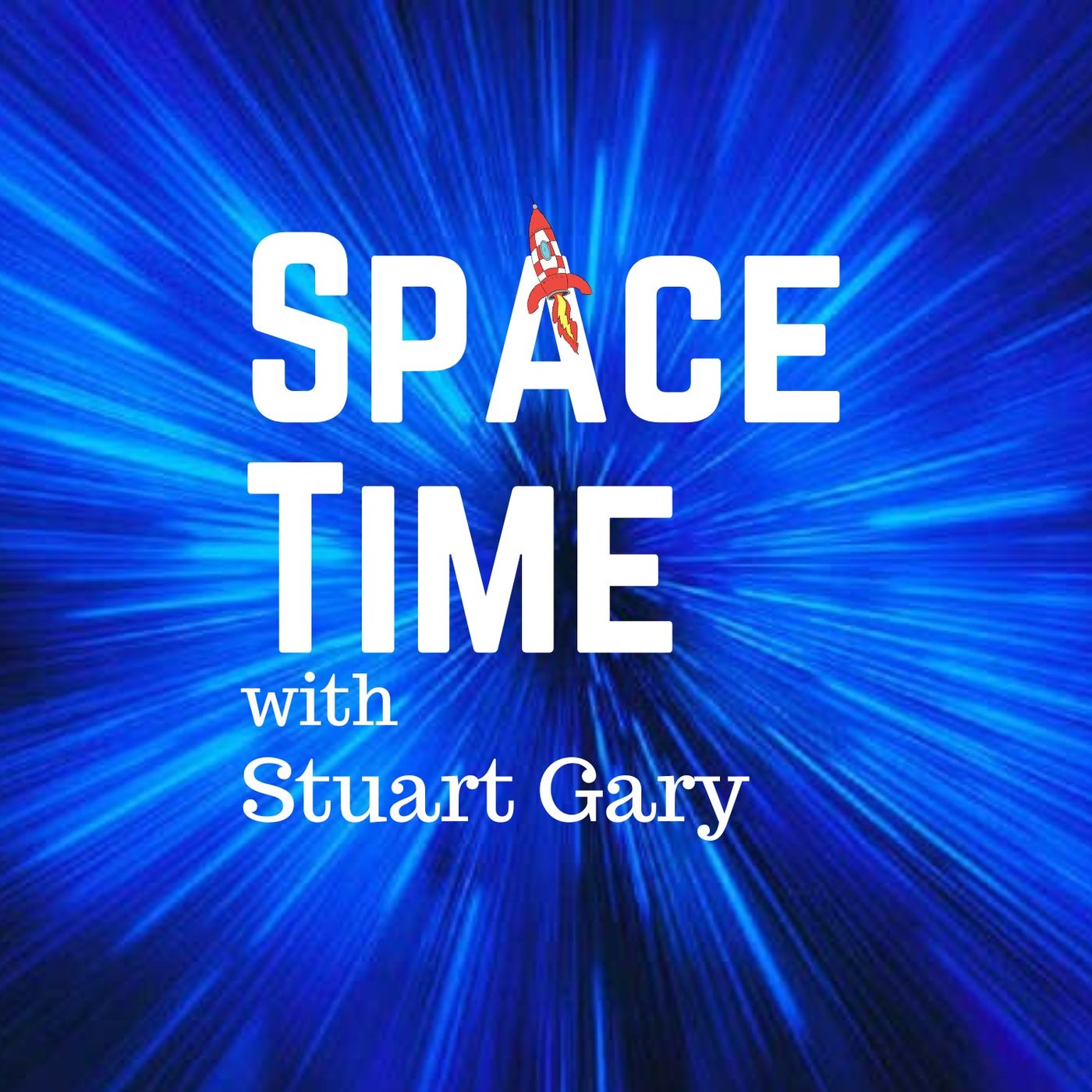SpaceTime with Stuart Gary
Join host Stuart Gary for weekly explorations into Astronomy, Space, and Science News, featuring insights from 19 years on Australian Public Radio and industry experts.Become a supporter of this podcast: https://www.spreaker.com/podcast/spacetime-with-stuart-gary--2458531/support.
Martian Gullies and Inside-Out Planets: Discoveries from the Cosmos
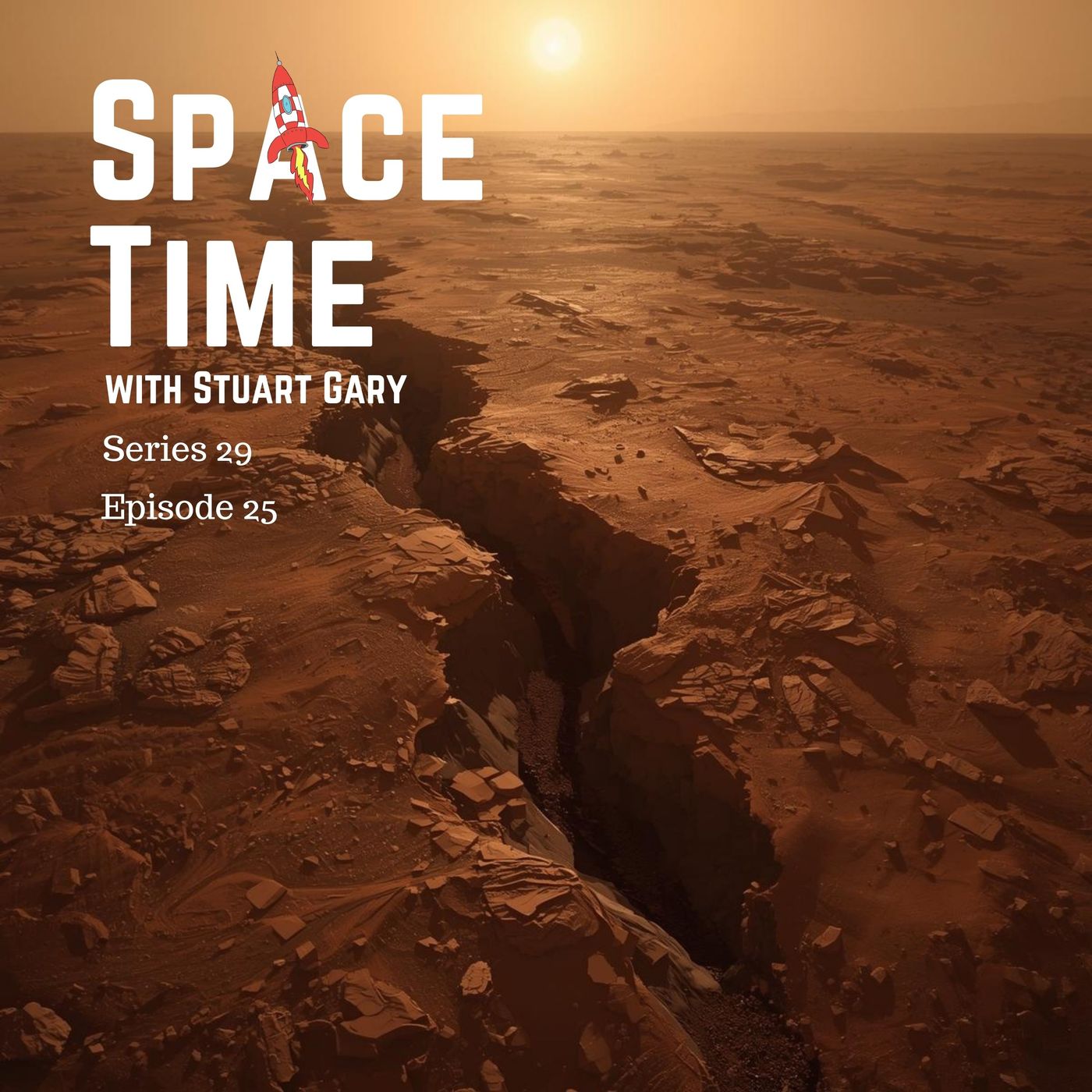
Sponsor Link:
This episode of SpaceTime is brought to you by Squarespace. Create your own exceptional website with ease at squarespace.com/spacetime.
SpaceTime with Stuart Gary Gary - Series 29 Episode 25
In this episode of SpaceTime, we explore the intriguing mysteries of Mars' gullies, uncover a unique inside-out planetary system, and witness the inaugural launch of Europe's most powerful rocket.
Mysterious Martian Gullies Explained
Scientists have made significant strides in understanding the enigmatic gullies on Mars, previously thought to be shaped by unkn...
The Birth of a Black Hole and Mars' New Navigation
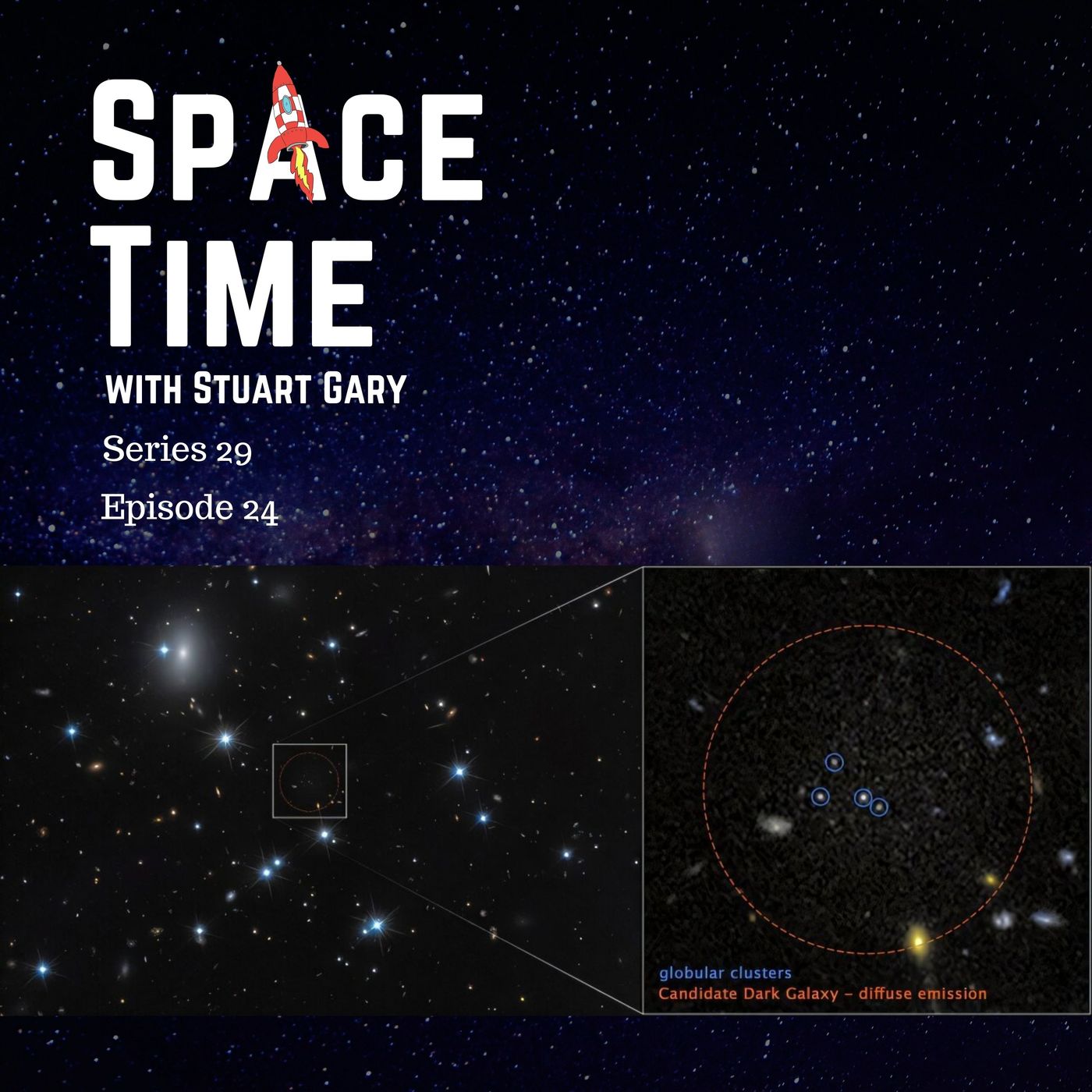
Sponsor Link:
This episode of SpaceTime is brought to with the kind support of Squarespace. Bring your stories to life with Squarespace, the easiest way to create an exceptional website, blog, portfolio, or online store. To check out our special offers, vist squarespace.com/spacetime and us the promo code SPACETIME.
SpaceTime with Stuart Gary Gary - Series 29 Episode 24
In this episode of SpaceTime, we uncover astonishing discoveries about the birth of black holes, a revolutionary Martian navigation system, and the arrival of NASA's S...
Dark Matter Galaxies and Artemis Delays: Unraveling the Secrets of the Cosmos
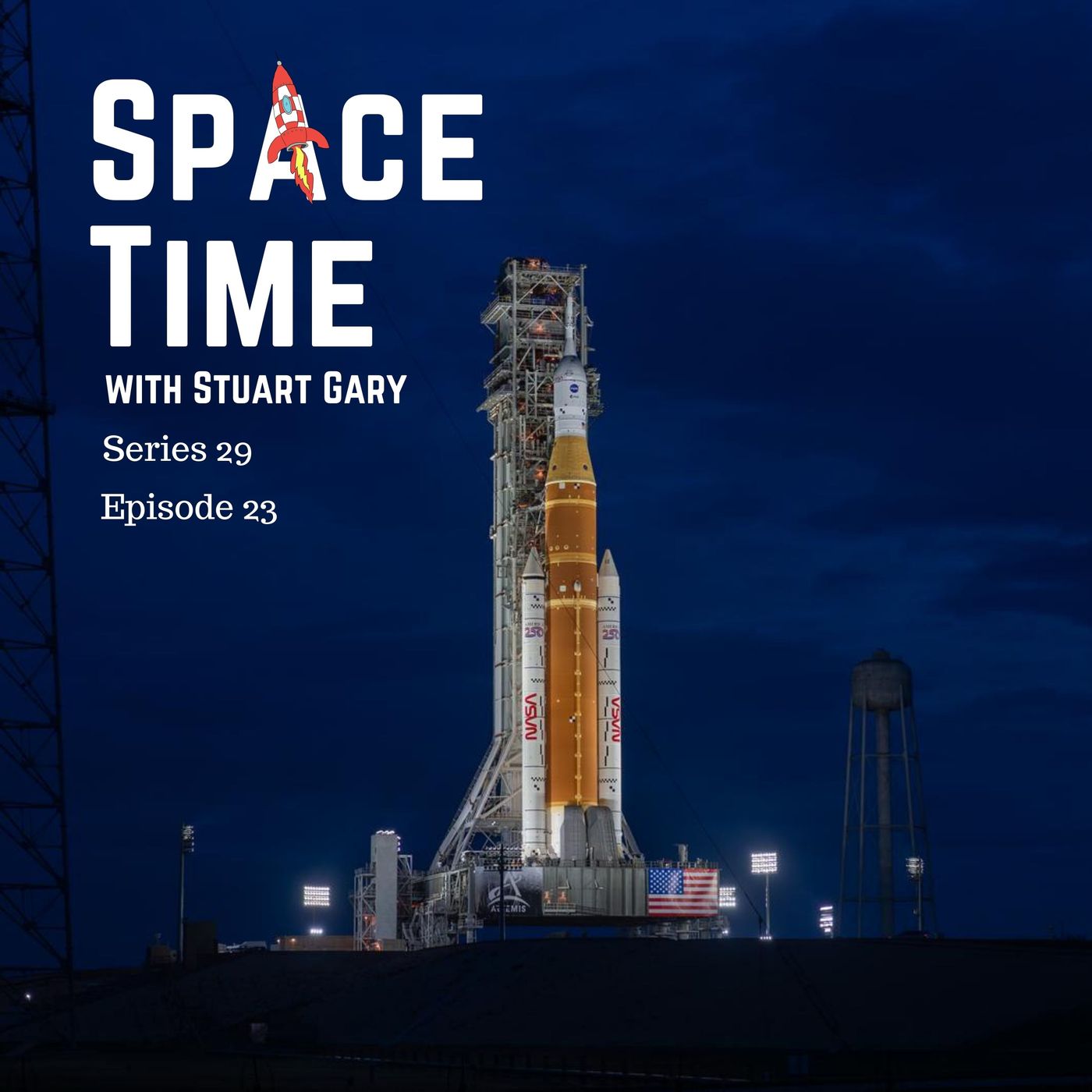
Sponsor Link:
This episode of Spacetime is brought to you with the support of Squarespace...when it's time to get online, it's time to visit Squarespace. Free trial. To find out more visit squarespace.com/spacetime
SpaceTime with Stuart Gary Gary - Series 29 Episode 23
In this episode of SpaceTime, we investigate the discovery of a nearly invisible galaxy dominated by dark matter, the latest delays in the Artemis 2 mission to the Moon, and the anticipated launch of Australia's new hypersonic scramjet.
A Dark Matter Galaxy Un...
Primordial Black Holes and Saturn's Ring Origins: Unveiling Cosmic Mysteries
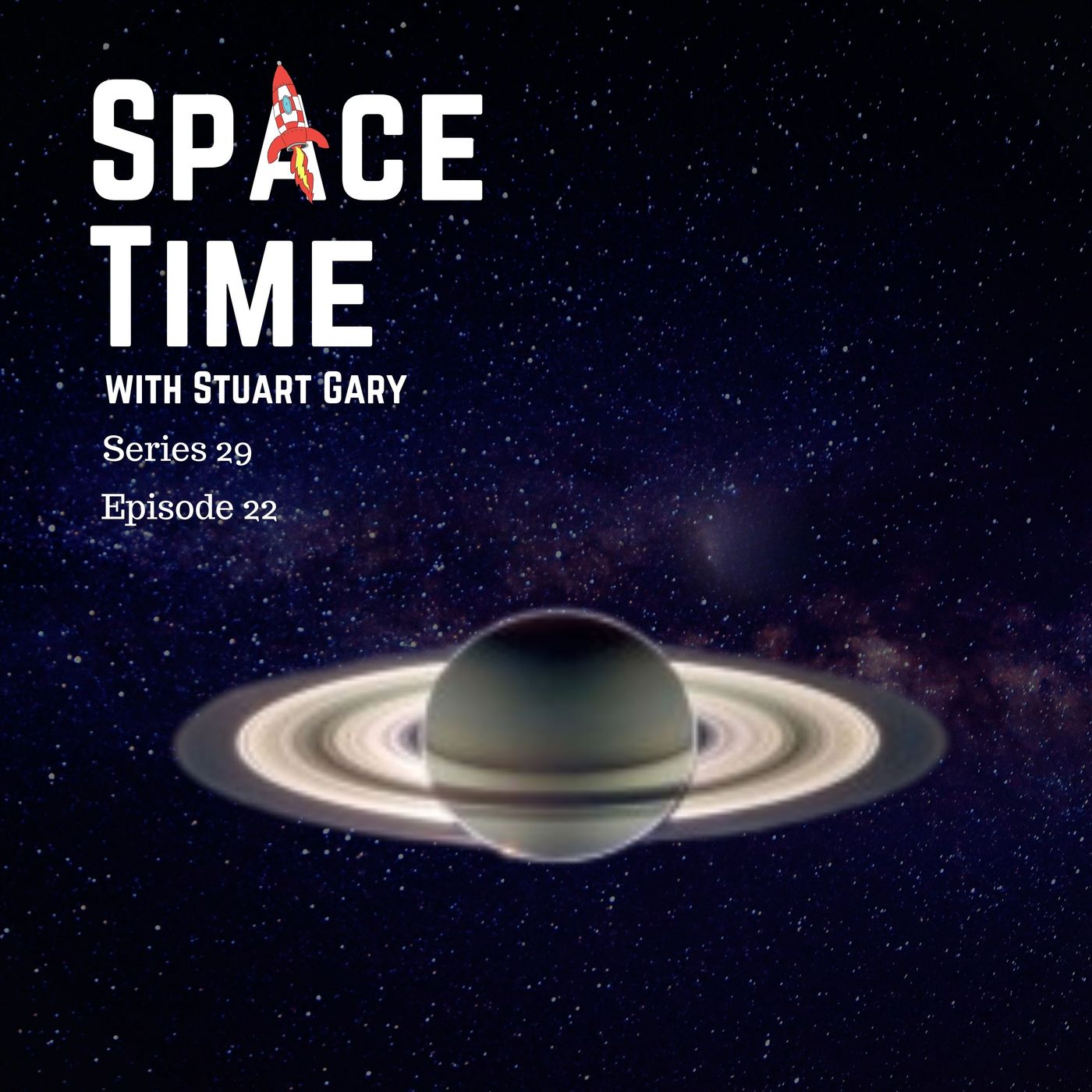
SpaceTime with Stuart Gary Gary - Series 29 Episode 22
In this episode of SpaceTime, we delve into the formation of the universe's most enigmatic objects, explore the origins of Saturn's iconic rings, and get updates on NASA's Artemis 2 mission.
Black Holes and Exotic Cosmic Structures
A groundbreaking study suggests that some of the universe's most exotic entities, including black holes and cannibal stars, may have formed just seconds after the Big Bang. Researchers from the International School of Advanced Studies propose that subatomic particles condensed into halos of matter, which then collapsed t...
Exploring Life's Potential on the Red Planet and Saturn's Tiny Moon
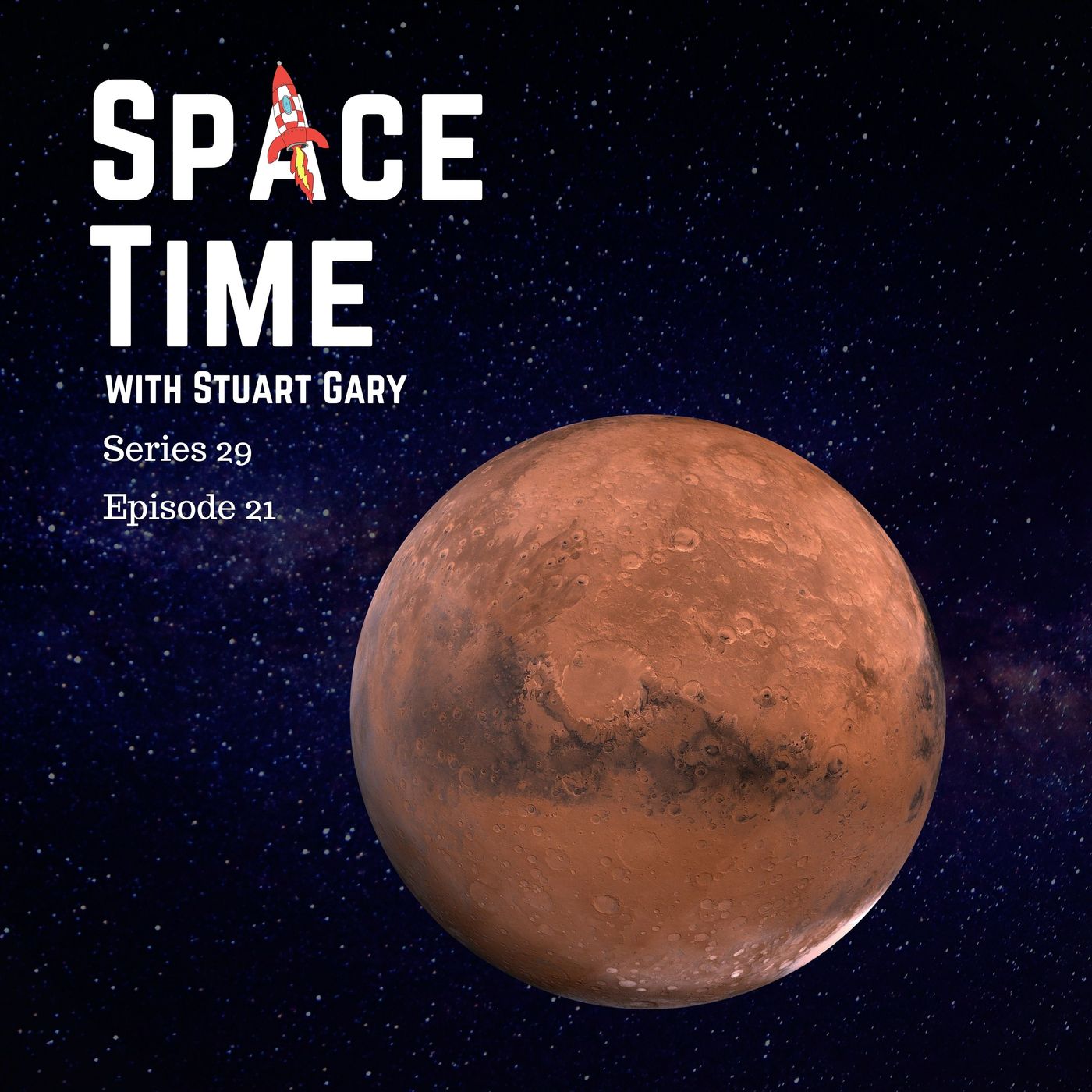
SpaceTime with Stuart Gary Gary - Series 29 Episode 21
In this episode of SpaceTime, we explore intriguing revelations about the search for life on Mars, the surprising effects of Saturn's moon Enceladus on its planet, and the monumental volcanic events that reshaped Earth's tectonic landscape.
Life on Mars: A New Perspective
Recent findings suggest that non-biological processes cannot fully explain the organic compounds found in Martian regolith samples collected by NASA's Curiosity rover. Published in the journal Astrobiology, the study indicates that life may have contributed to some of these compounds, challenging p...
Earth's Core Secrets and Solar Neutrinos: Unveiling the Mysteries of Our Planet and the Sun
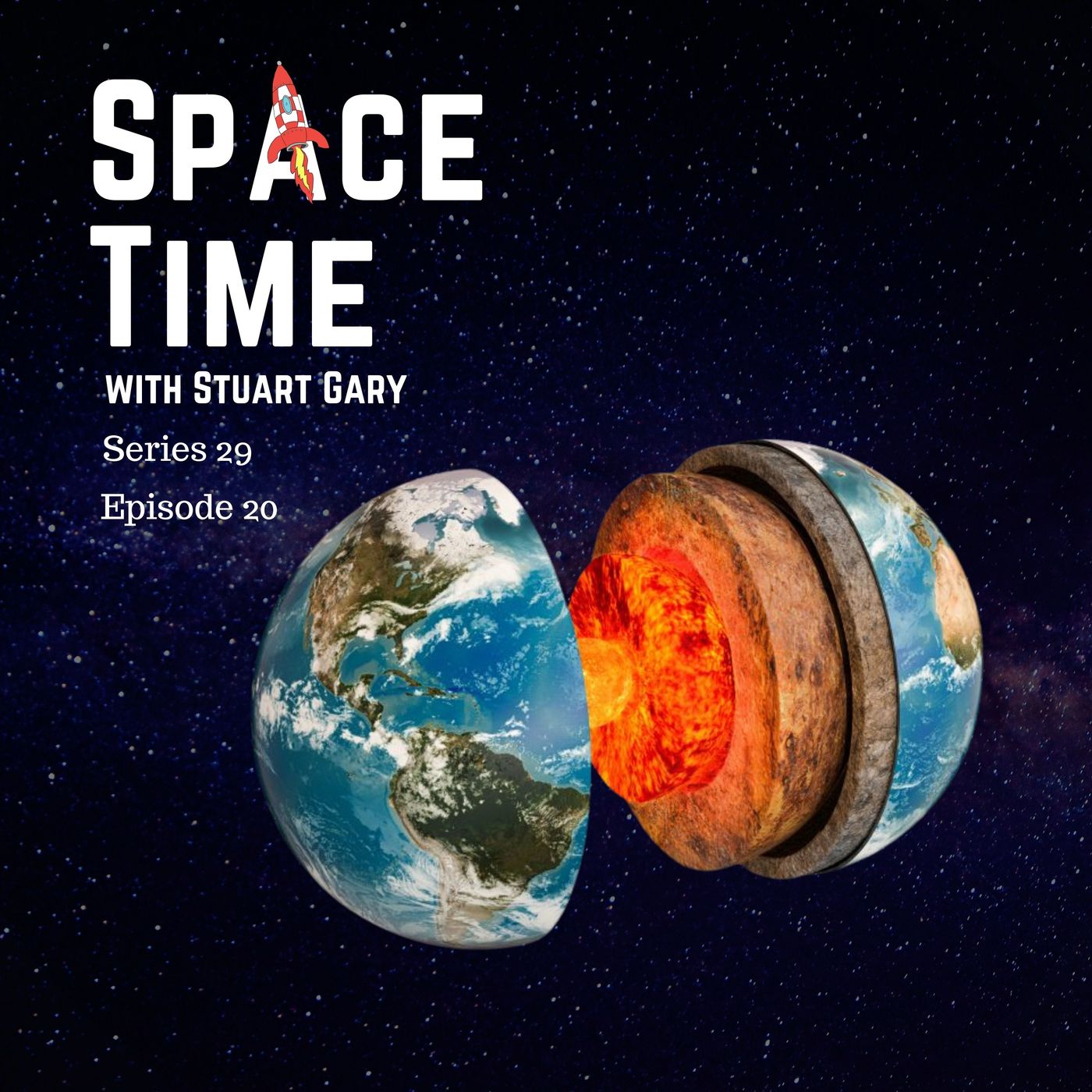
In this episode of SpaceTime, we dive into groundbreaking research revealing the true composition of the Earth's core, explore new insights into solar neutrinos, and uncover the complexities of Martian volcanoes.
Earth's Core Contains Vast Hydrogen Reservoir
A recent study published in Nature Communications indicates that Earth's core may hold up to 45 oceans' worth of hydrogen, challenging the long-held belief that water on our planet primarily came from asteroids and comets. Utilizing advanced laboratory techniques, researchers simulated the extreme conditions of the core to uncover its surprising hydrogen content, suggesting a significant internal source o...
Black Hole Explosions and Martian Water Loss: Unraveling Cosmic Mysteries and Planetary Secrets
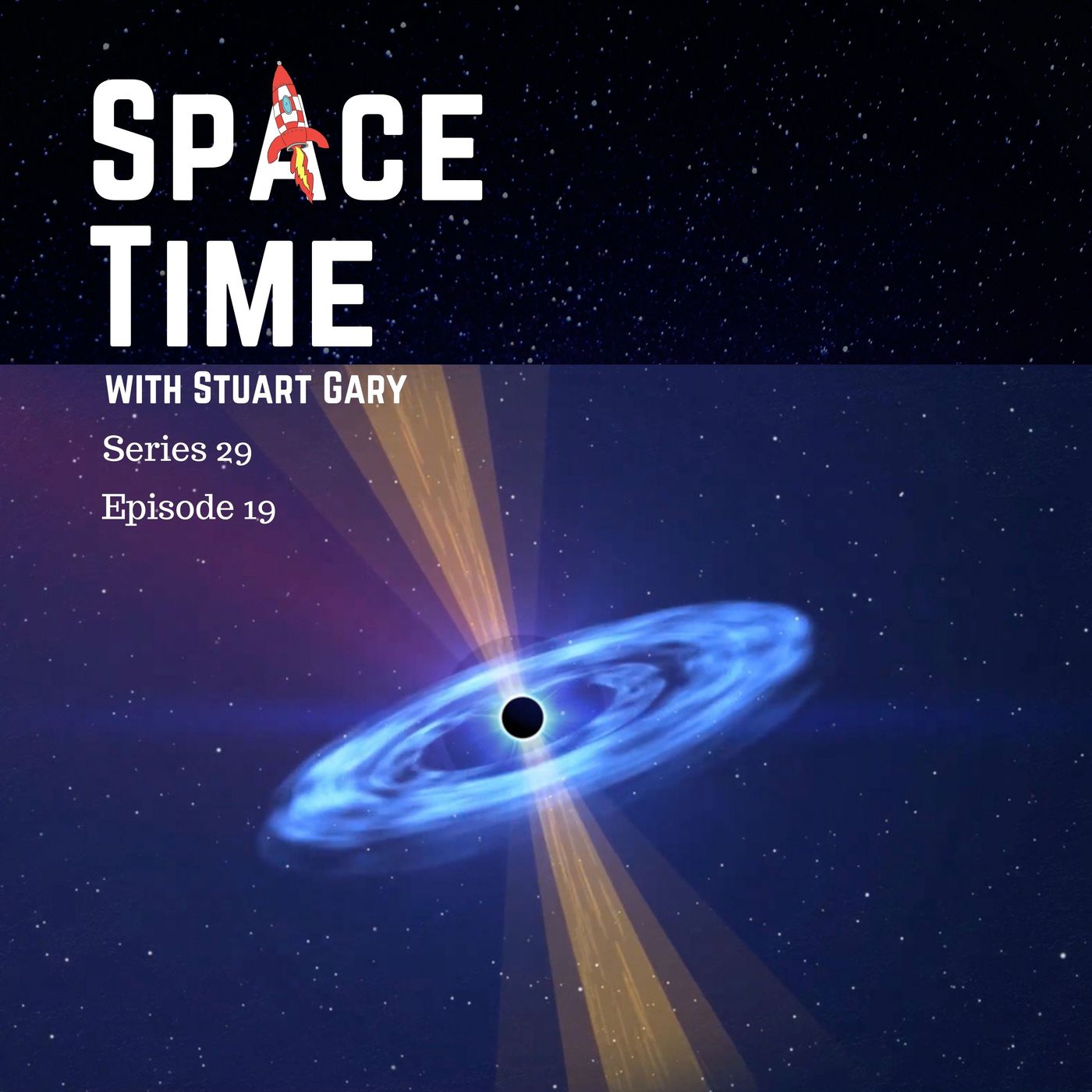
Sponsor Link:
This episode of SpaceTime is brought to with the help of Squarespace. When it's time to get online, you need Suarespace to make you look professional. To get the Spacetime special offer simply visit www.squarespace.com/spacetime or use the code SPACETIME at checkout.
SpaceTime with Stuart Gary Gary - Series 29 Episode 19
In this episode of SpaceTime, we explore astonishing discoveries in astrophysics, planetary science, and aerospace engineering.
Astronomers Observe Possible Black Hole Explosion
Astronomers are investigating w...
Dark Matter's Role and Lunar Mysteries: Unraveling the Secrets of Our Galaxy and Moon's Interior
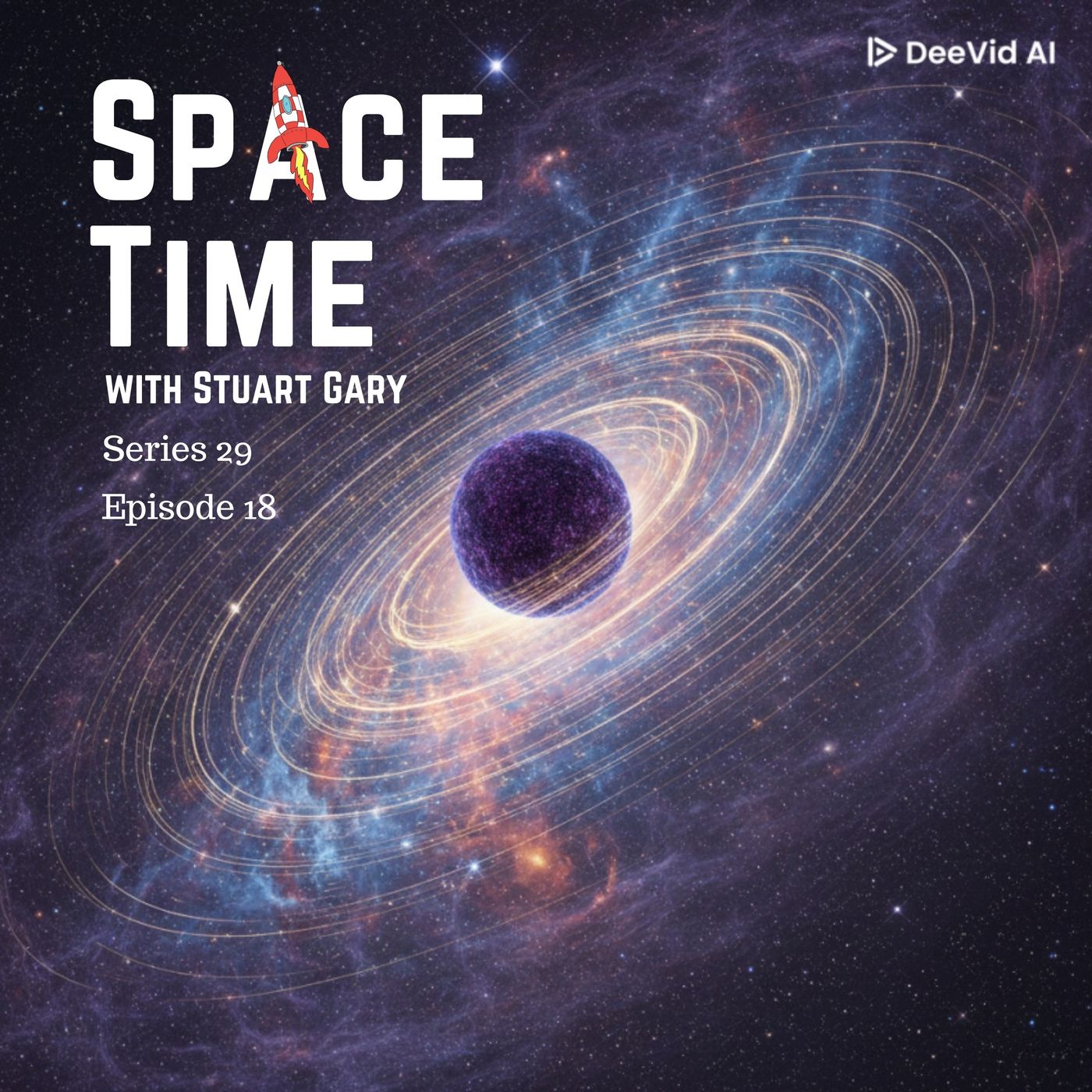
Sponsor Links:
This episode of SpaceTime is brought to you with the support of Squarespace....your first stop when you want to build a presence online. To check out our special offers, simply visit www.squarespace.com/spacetime for details
SpaceTime with Stuart Gary Gary - Series 29 Episode 18
In this episode of SpaceTime, we explore groundbreaking theories about the nature of dark matter, the thermal differences between the lunar far and near sides, and new revelations regarding Jupiter's dimensions.
Dark Matter's Role in...
Solar Storms and Artemis Delays: Navigating the Fury of the Sun and Lunar Ambitions
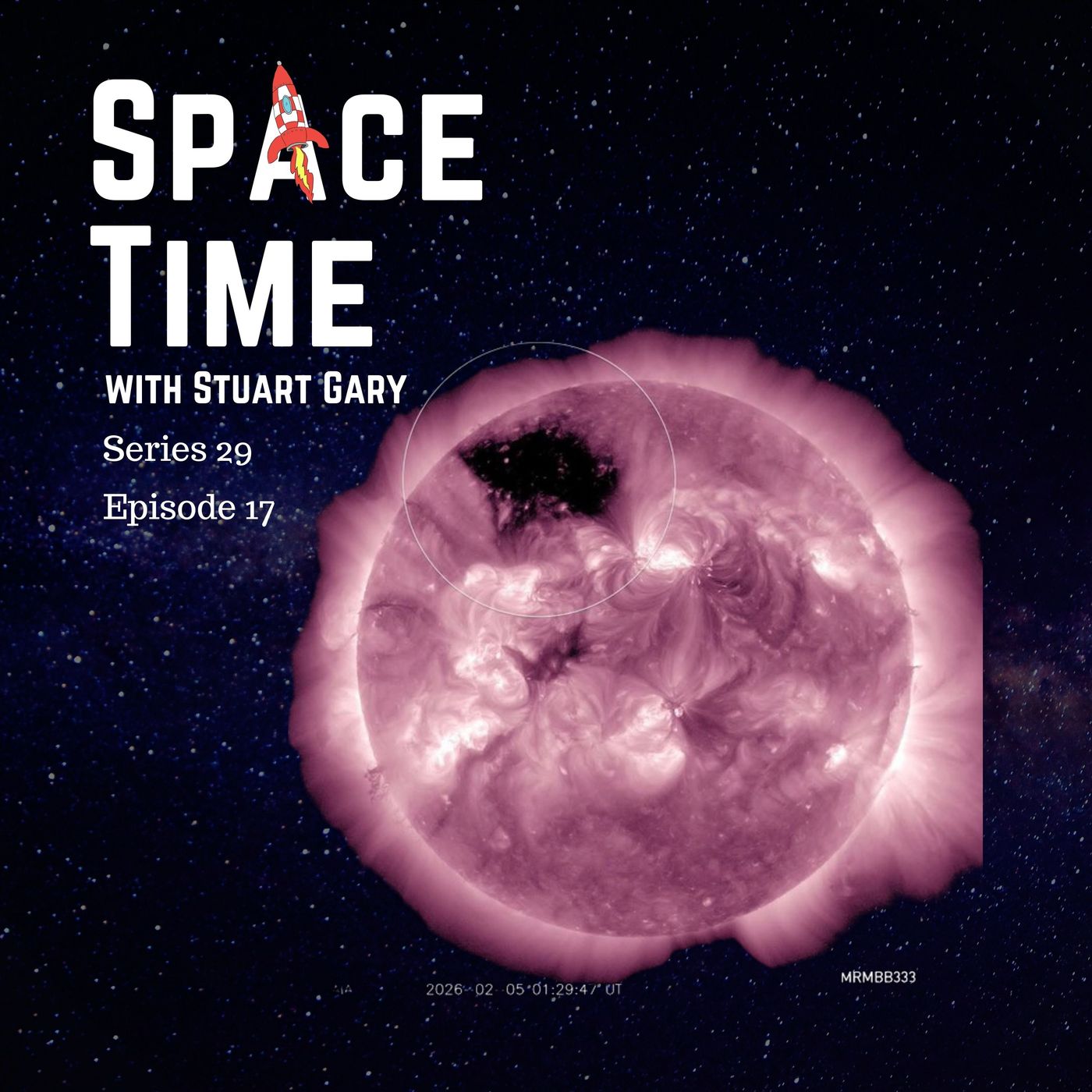
Sponsor Links:
This episode of SpaceTime is brought to you with the support of Squarespace....your first stop when you want to build a presence online. To check out our special offers, simply visit www.squarespace.com/spacetime for all the details
SpaceTime with Stuart Gary Gary - Series 29 Episode 17
In this episode of SpaceTime, we delve into the recent powerful solar storm that has impacted Earth, the delay of NASA's Artemis 2 manned moon mission, and China's ambitious plans for a futuristic orbital space ca...
Europa's Ice Shell and Planet Nine: Unveiling the Thickness of Frozen Worlds and Cosmic Oddities
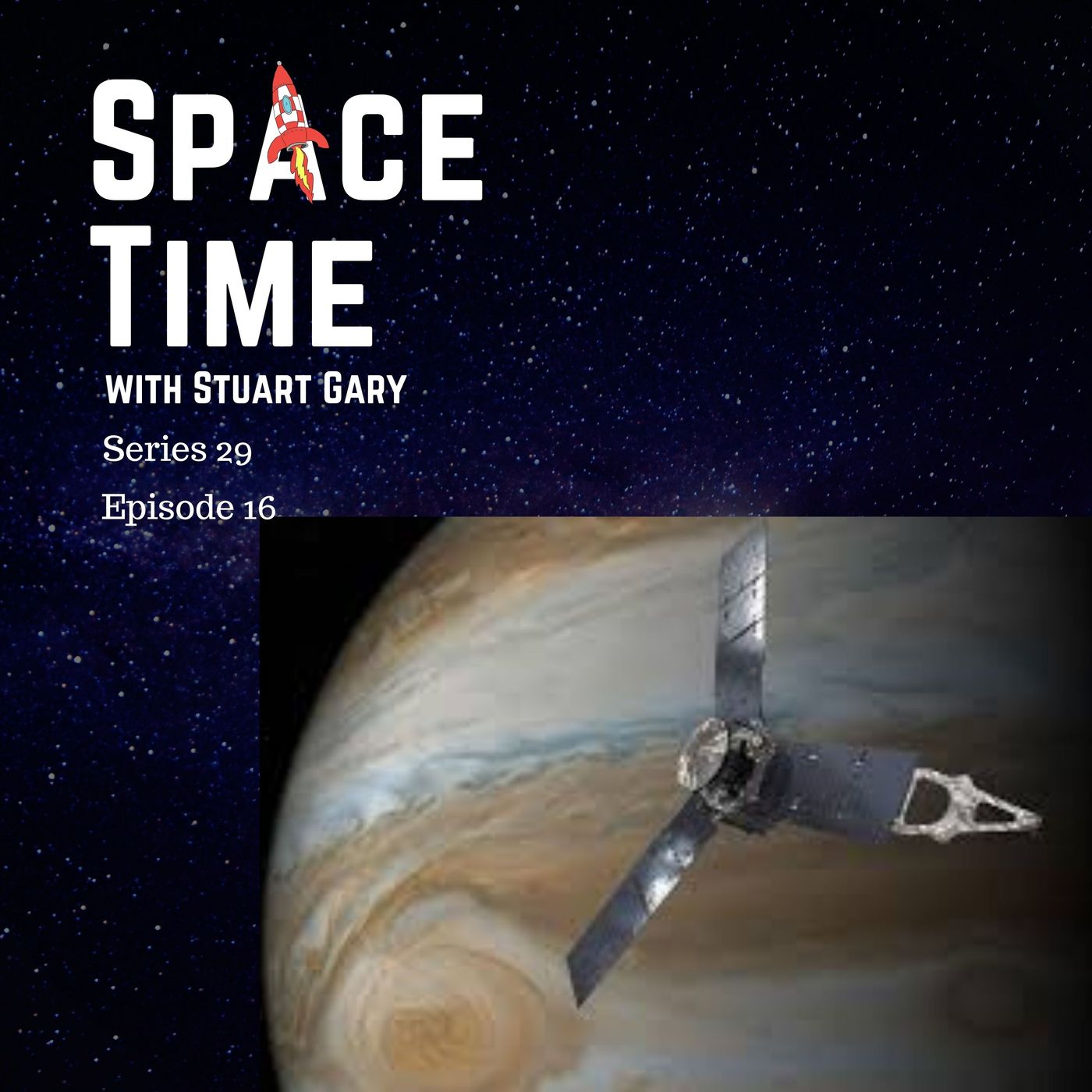
SpaceTime with Stuart Gary Gary - Series 29 Episode 16
In this episode of SpaceTime, we dive into groundbreaking revelations about Europa's ice shell, explore new evidence for the existence of a potential Planet Nine, and discuss a significant advancement in quantum physics that challenges the Heisenberg Uncertainty Principle.
Europa's Ice Shell Thickness Revealed
Data from NASA's Juno mission has provided the first insights into the thickness of Europa's icy crust, estimating it to be around 29 kilometers. This measurement comes from Juno's 2022 flyby, where the spacecraft utilized its microwave radiometer to analyze the m...
Mercury's Hidden Activity and Titan's Dragonfly: Exploring Volatile Streaks and Robotic Rotocopters
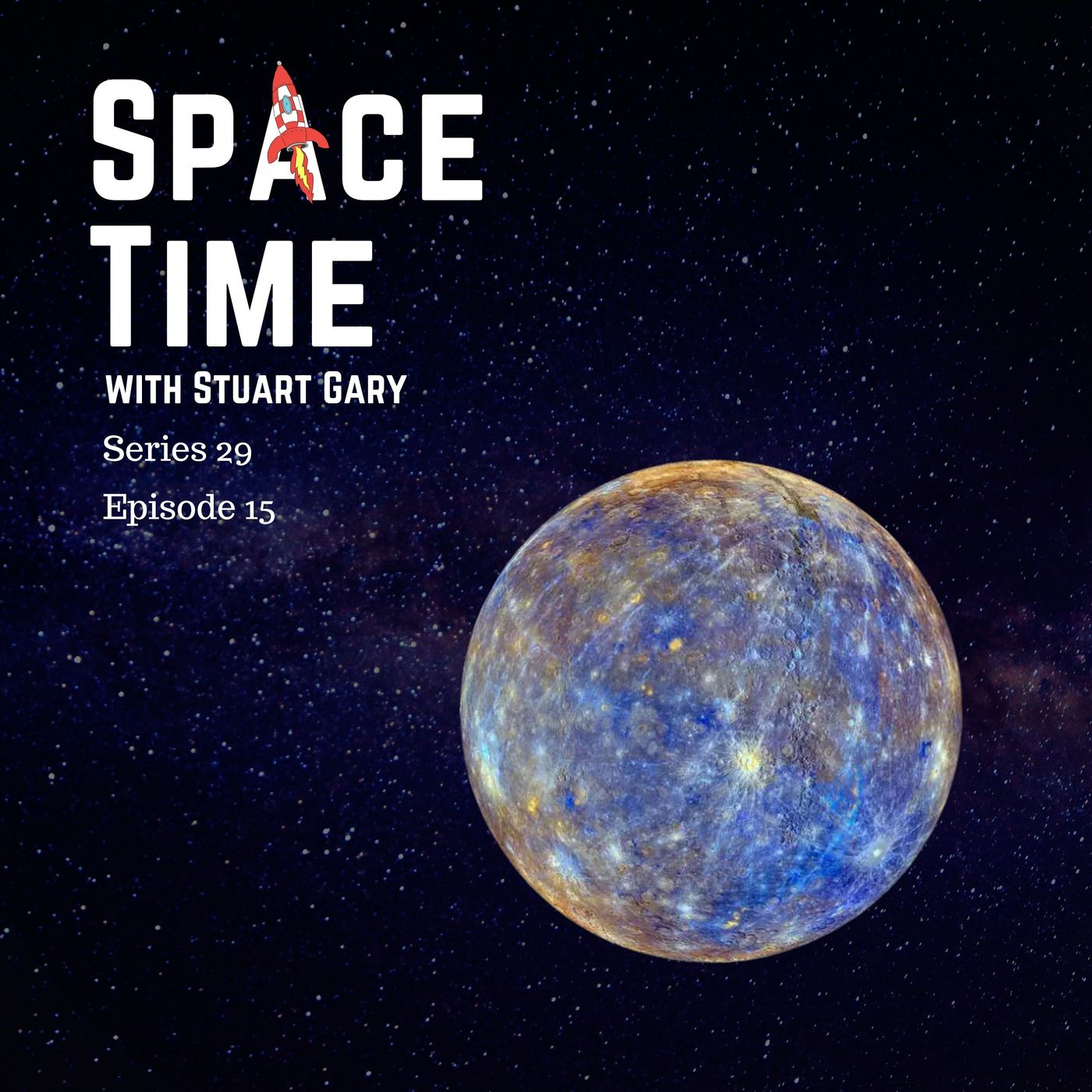
SpaceTime with Stuart Gary Gary - Series 29 Episode 15
In this episode of SpaceTime, we uncover intriguing discoveries about Mercury's geological activity, NASA's innovative Dragonfly mission to Titan, and the environmental impacts of rocket fuel pollution.
Mercury's Surprising Streaks
A new study reveals bright streaks, or lineae, on Mercury's surface, suggesting the planet is not as geologically inactive as previously thought. Researchers from the University of Bern utilized machine learning to analyze over 100,000 images from NASA's MESSENGER spacecraft, discovering that these streaks are likely caused by the outgassing of volatile materials from b...
Earth's Water Origins and Io's Volcanic Secrets: Unveiling Tectonic Climate Drivers and Lunar Archives
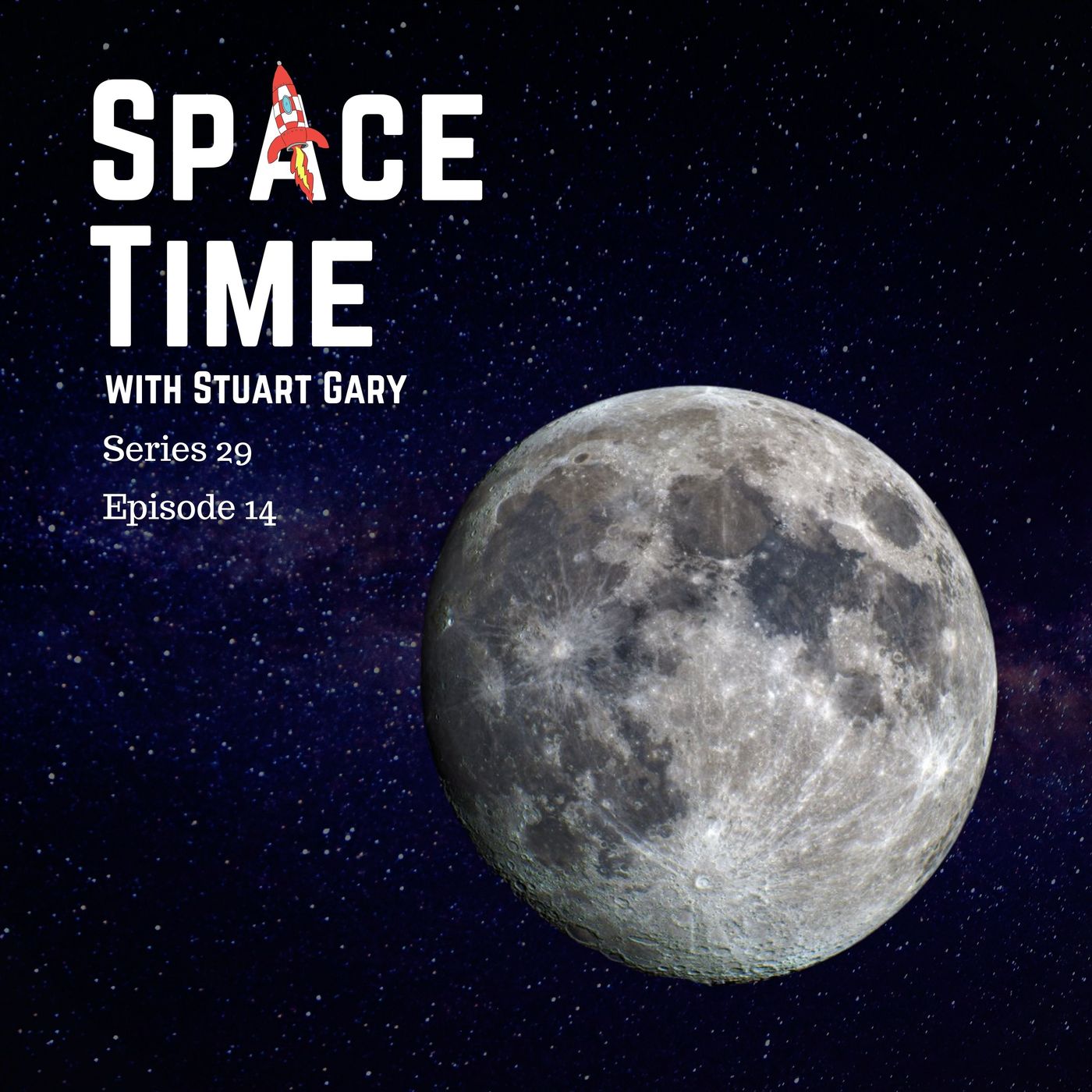
In this episode of SpaceTime, we explore new insights into the origins of Earth's water, groundbreaking discoveries beneath the surface of Jupiter's volcanic moon Io, and how tectonic plate movements may have influenced Earth's climate throughout history.
New Clues on Earth's Water Origins
A recent study published in the Proceedings of the National Academy of Sciences reveals that asteroid and comet impacts could only account for a small fraction of Earth's water supply. By analyzing oxygen isotopes in lunar regolith collected during the Apollo missions, researchers found that the early Earth likely retained little t...
Cosmic Echoes and Jovian Secrets: Unraveling the Milky Way's Black Hole and Jupiter's Water Mysteries
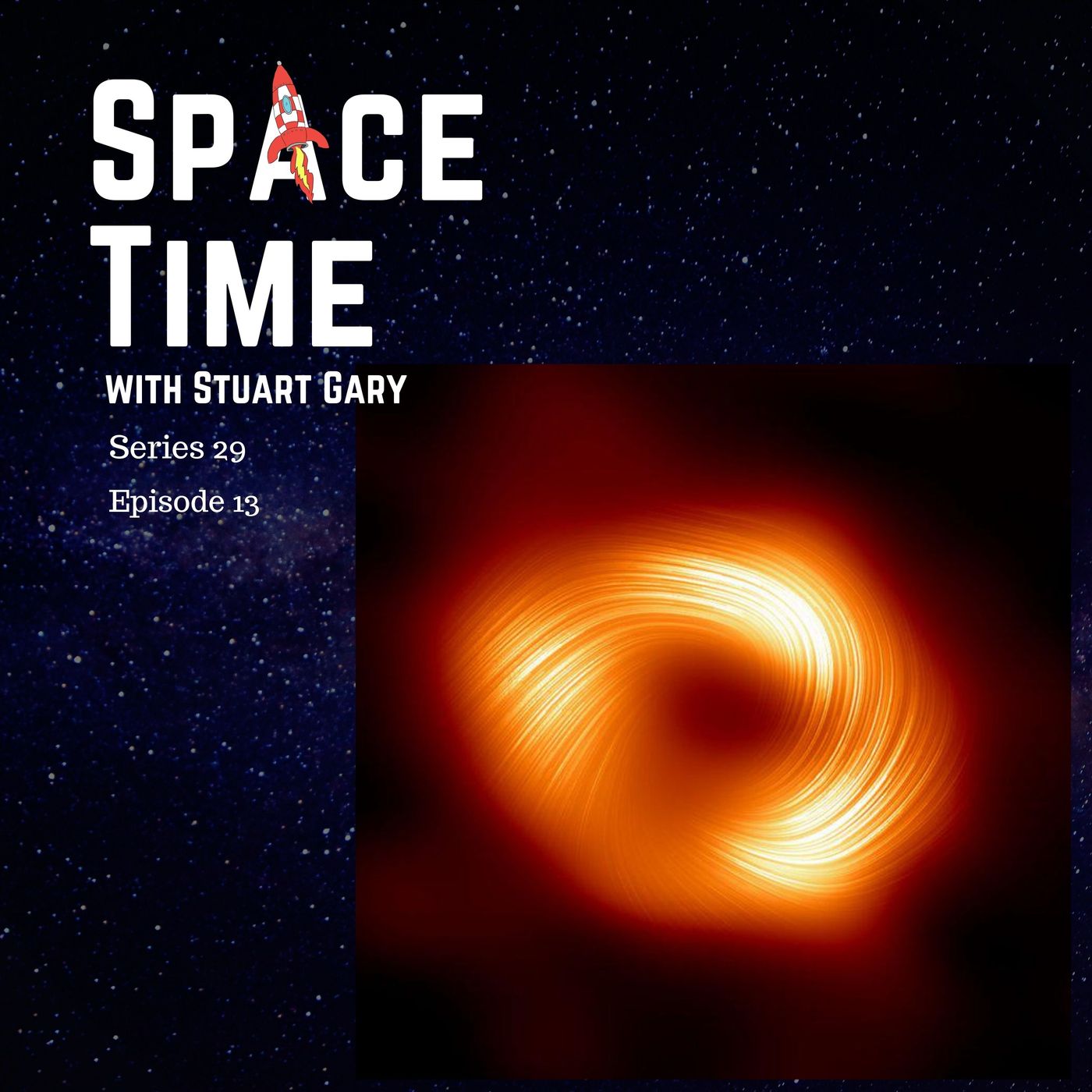
Sponsor Link:
This episode is brought to you with thanks to Squarespace. Bring your stories to life with Squarespace, the easiest way to create an exceptional website, blog, portfolio, or online store. To take up our great offer and help support the show, just visit www.squarespace.com/spacetime or use the Promo Code SPACETIME at checkout.
SpaceTime with Stuart Gary Gary - Series 29 Episode 13
In this episode of SpaceTime, we uncover the hidden violent past of the M...
Earth's Hidden Mantle Secrets: Mars' Blue Past and the Cosmic Gas Pipeline of Galaxy Growth
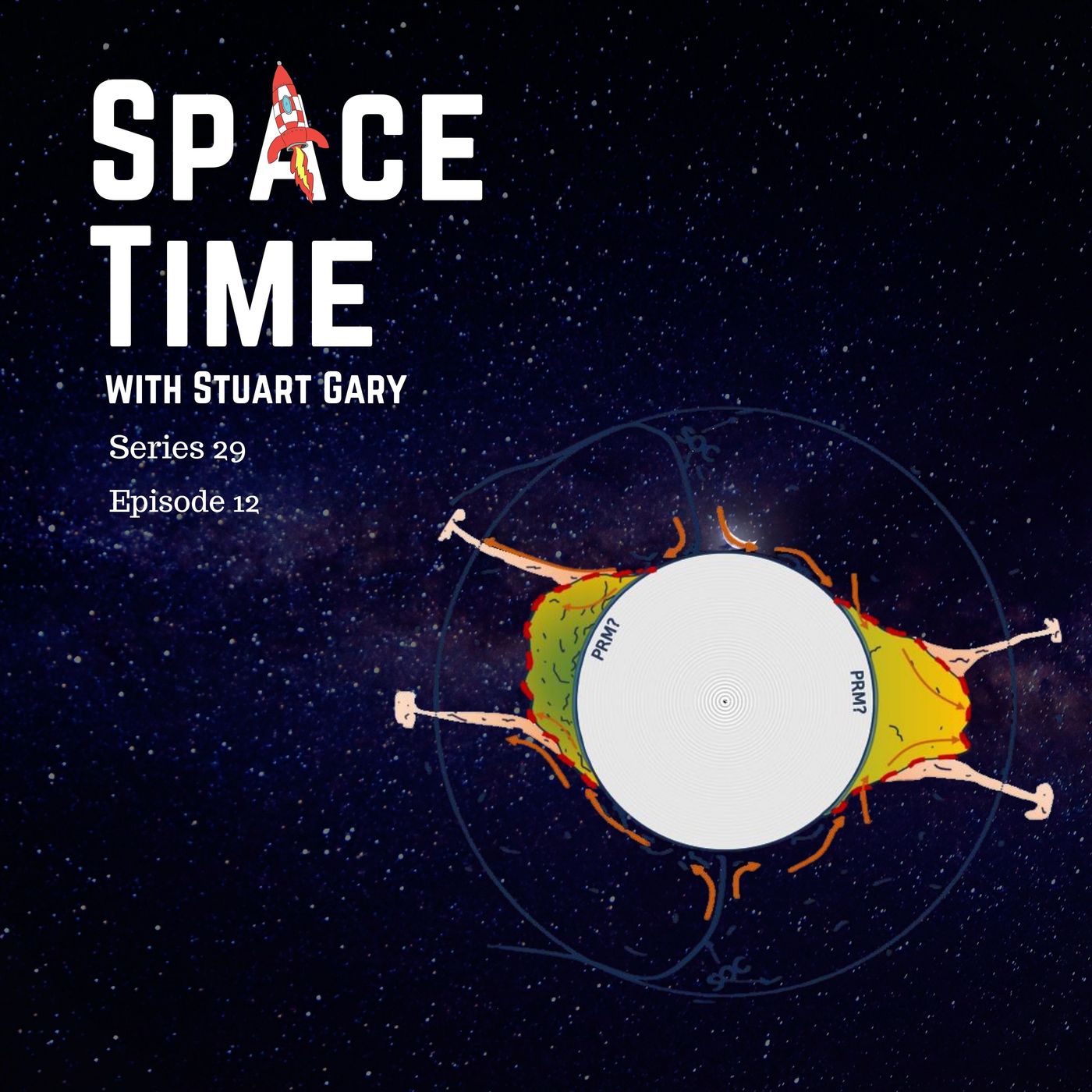
Sponsor Link:
This episode is brought to you with thanks to Squarespace. Bring your stories to life with Squarespace, the easiest way to create an exceptional website, blog, portfolio, or online store. To take up our great offer and help support the show, just visit www.squarespace.com/spacetime or use the Promo Code SPACETIME at checkout.
SpaceTime with Stuart Gary Gary - Series 29 Episode 12
In this episode of SpaceTime, we uncover groundbreaking discoveries about Earth's mantle, the w...
Solar Storms and Lunar Returns: The Artemis 2 Mission and Earth's Record-Breaking Solar Flare
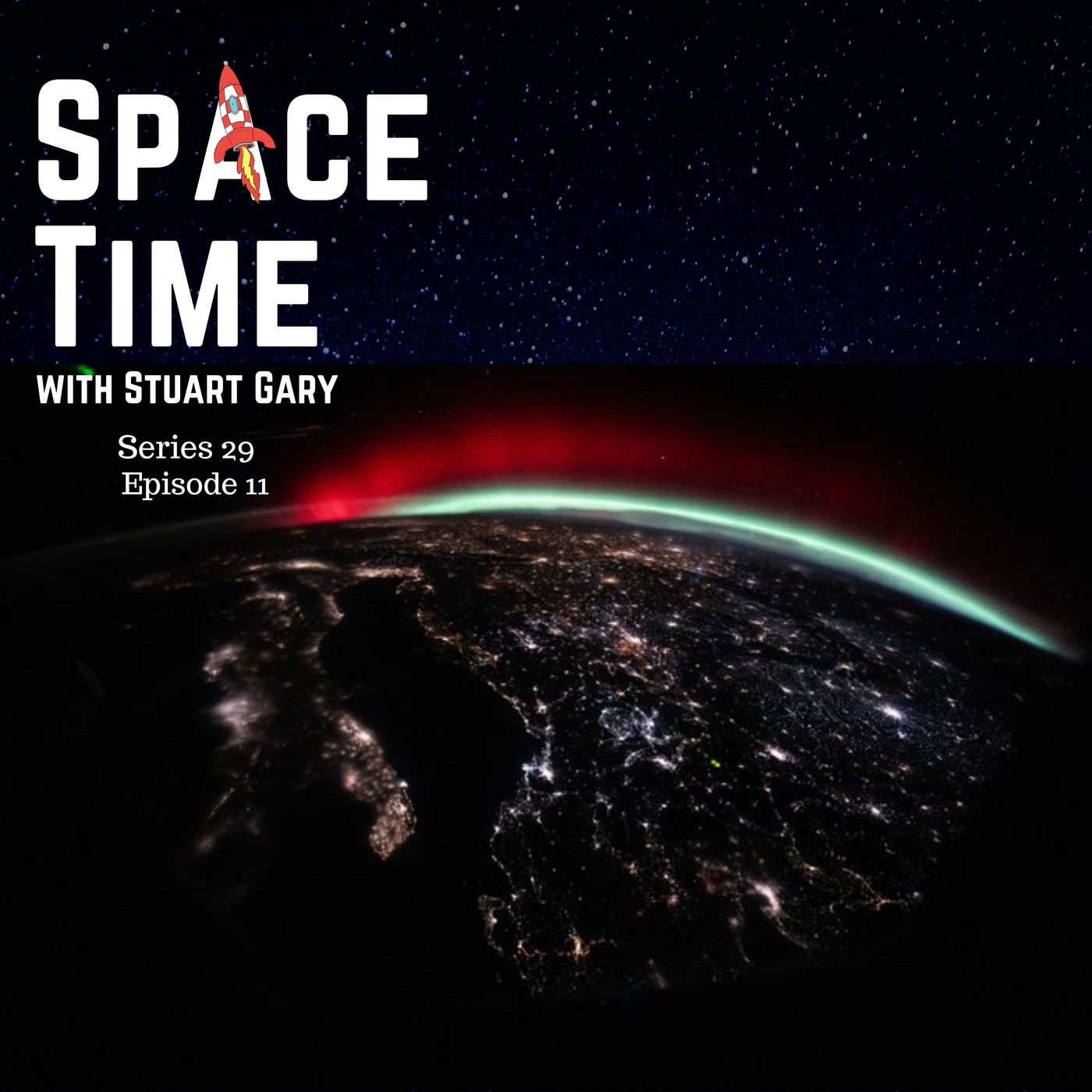
Sponsor Link:
This episode is brought to you with thanks to Squarespace. Bring your stories to life with Squarespace, the easiest way to create an exceptional website, blog, portfolio, or online store. To take up our great offer and help support the show, just visit www.squarespace.com/spacetime or use the Promo Code SPACETIME at checkout.
SpaceTime with Stuart Gary Gary - Series 29 Episode 11
In this episode of SpaceTime, we dive into the latest astronomical events, including a record-setting solar storm i...
Nuclear Rockets and Cosmic Mergers: Exploring the Future of Space Travel and Galactic Evolution
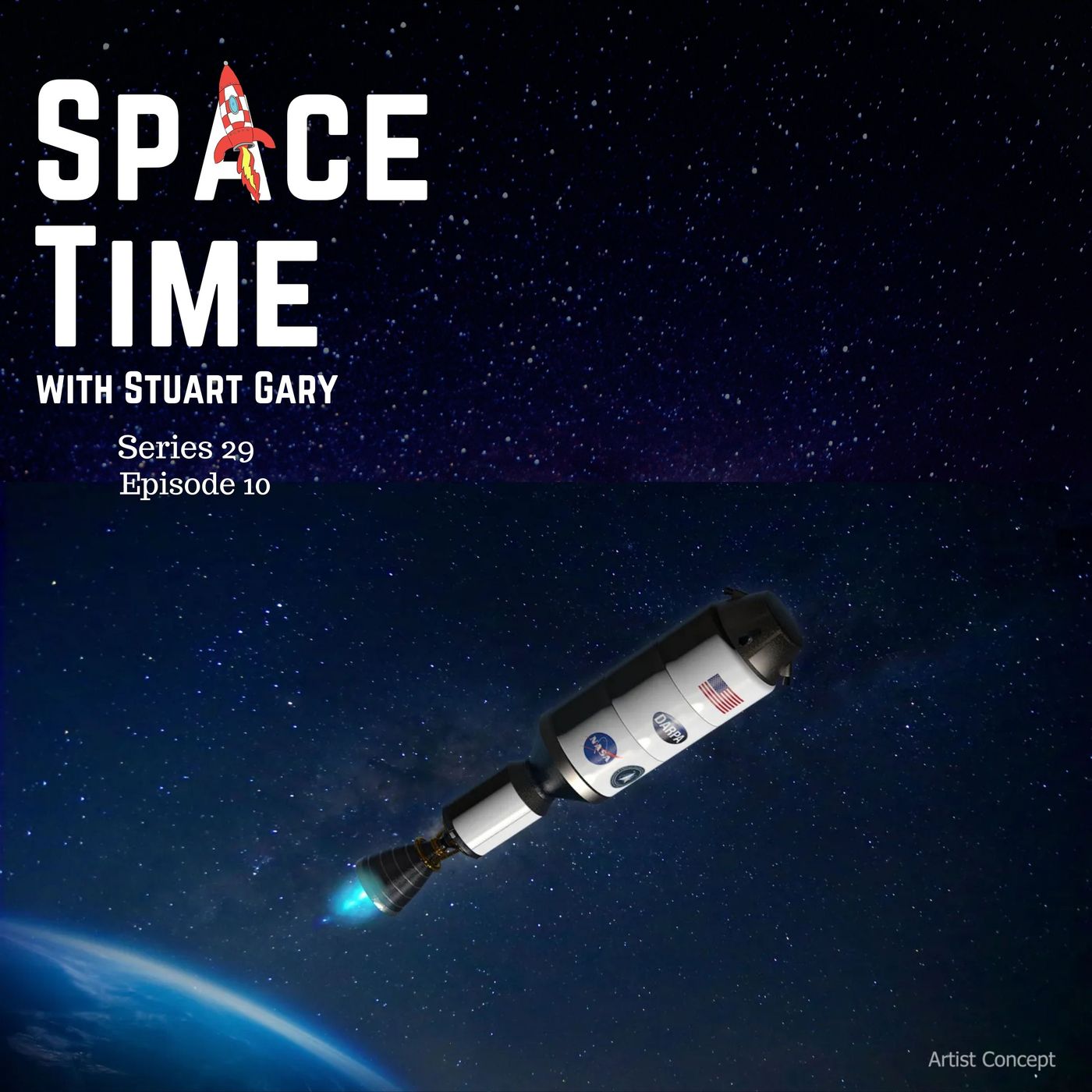
SpaceTime with Stuart Gary Gary - Series 29 Episode 10
In this episode of SpaceTime, we explore groundbreaking developments in space exploration, including the imminent launch of the first nuclear-powered rocket, the merging of low mass dwarf galaxies, and the intriguing connection between Earth-like planets and gas giants.
The Dawn of Nuclear Rocket Technology
History is set to be made as NASA and DARPA prepare to test the world’s first fully operational nuclear-powered orbital rocket. This innovative vehicle utilizes a nuclear thermal propulsion system that heats liquid hydrogen propellant through nuclear fusion, ach...
Cosmic Mysteries: Unveiling the Secrets of Black Holes, Jupiter's Oxygen, and Earth's Gamma Ray Revolution

SpaceTime with Stuart Gary Gary - Series 29 Episode 9
In this episode of SpaceTime, we unravel the enigma of the universe's mysterious little red dots, delve into groundbreaking insights from Jupiter regarding the evolution of our solar system's planets, and mark the commencement of construction on Earth's largest gamma-ray observatory.
The Mystery of the Little Red Dots
A fascinating new study reveals that the enigmatic little red dots observed in early images from the NASA Webb Space Telescope are, in fact, young black holes cloaked in ionized gas. Researchers from the Niels B...
Mars and Earth's Climate: Unveiling the Cosmic Connection and Crew 11's Historic Return

SpaceTime with Stuart Gary Gary - Series 29 Episode 8
In this episode of SpaceTime, we investigate the surprising ways Mars influences Earth's climate, hear about the safe return of Crew 11 following the first emergency medical evacuation from the International Space Station, and explore a cosmic clock that reveals insights into Australia's geological history.
Mars: A Climate Influencer
A new study has unveiled that the orbit of Mars can significantly impact Earth's climate, even triggering ice ages. Researchers from the University of California Riverside utilized computer simulations to demonstrate how Mars’ gravitational pull alt...
Titan's Secrets: Unraveling the Chemistry of Life and the Enigma of Europa

Sponsor Link:
This episode of SpaceTime is brought to you with the support of Squarespace. When it's time to get a presence online, go with the folks who support us...and build the best websites easily. No hassles. You can check out their special offer for SpaceTime listeners by visiting our special URL....Click Here
SpaceTime with Stuart Gary Gary - Series 29 Episode 7
In this episode of SpaceTime, we delve into the intriguing possibilities surrounding the origins of life, including new findings from Saturn's moon...
Celestial Revelations: Betelgeuse's Hidden Companion and the Most Powerful Black Hole Event Ever Recorded
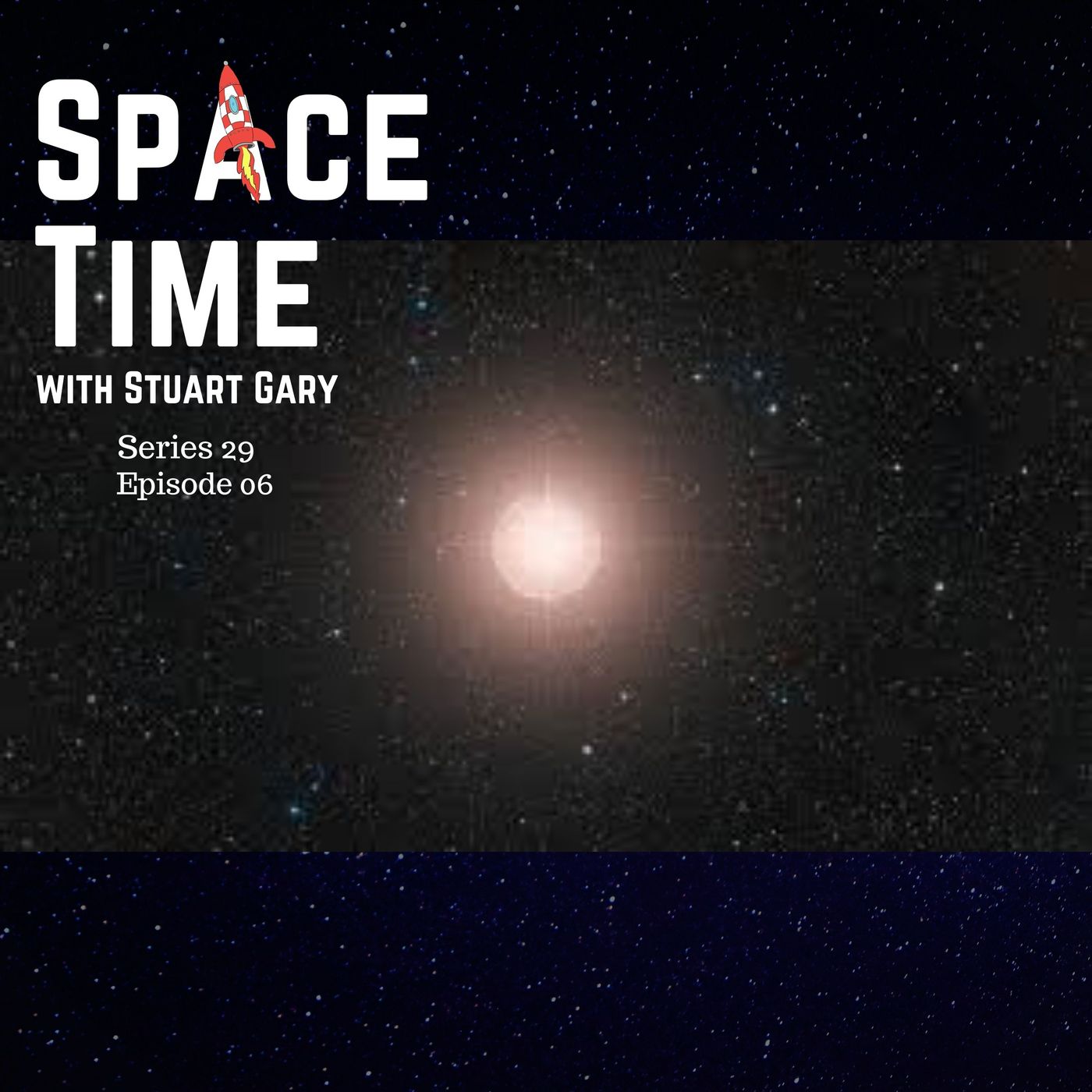
Sponsor Links:
This episode of SpaceTime is brought to you with the support of Squarespace. When it's time to get a presence online, go with the folks who support us...and build the best websites easily. No hassles. You can check out their special offer for SpaceTime listeners by visiting our special URL....Click Here
SpaceTime with Stuart Gary Gary - Series 29 Episode 6
In this episode of SpaceTime, we explore groundbreaking discoveries in astrophysics, including the confirmation of Betelgeuse's elusive companion star, a spectacular b...
Galactic Mechanics: How Dark Matter and Neutrinos Shape the Universe
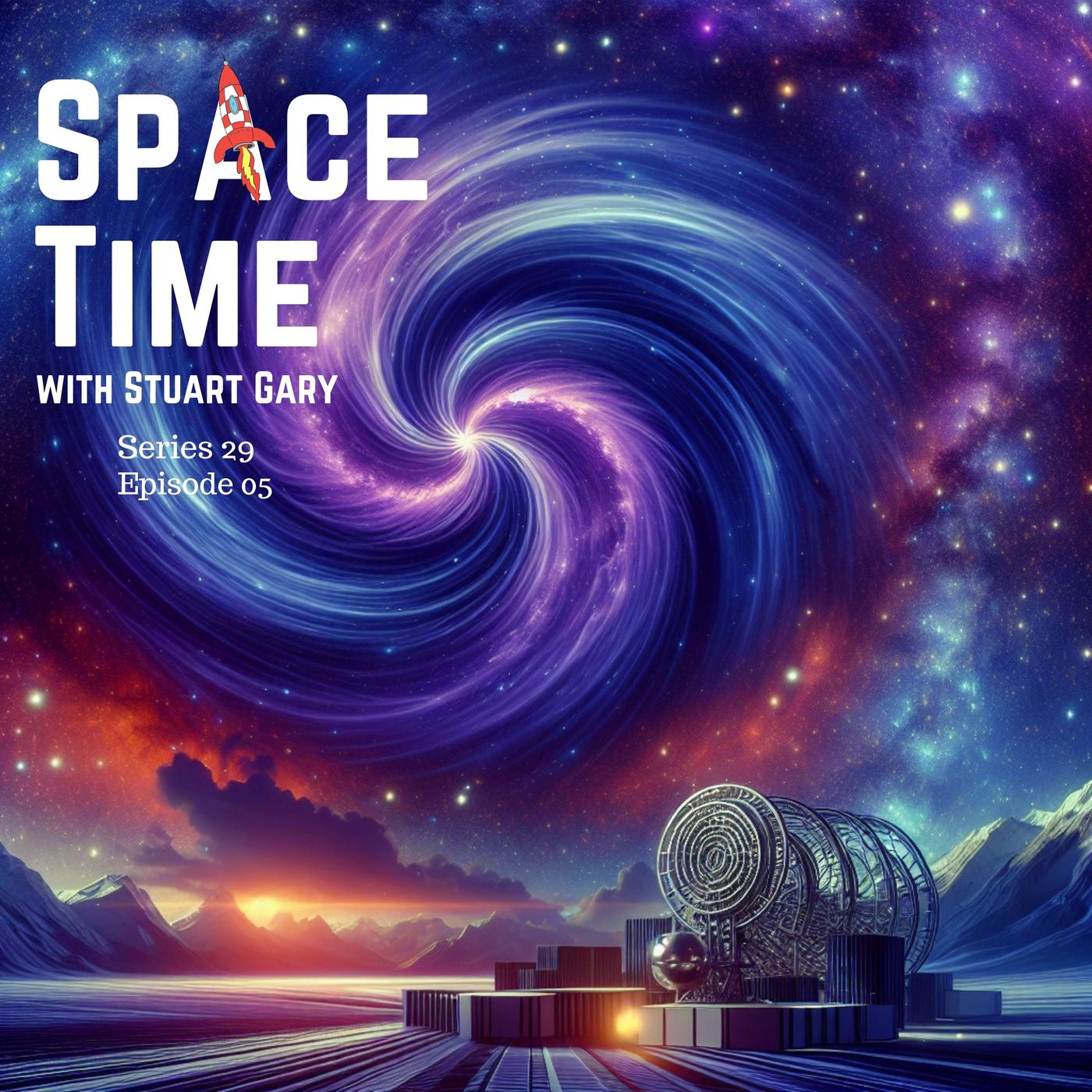
Sponsor Link:
This episode of SpaceTime is brought to you with the support of Squarespace. When it's time to get a presence online, go with the folks who support us...and build the best websites easily. No hassles. You can check out their special offer for SpaceTime listeners by visiting our special URL....Click Here
In this episode of SpaceTime, we uncover new evidence suggesting that dark matter may interact with neutrinos, a revelation that could reshape our understanding of the universe. We also discuss...
Galactic Mysteries: Unveiling Supermassive Black Holes and the Secrets of Comet 3I Atlas
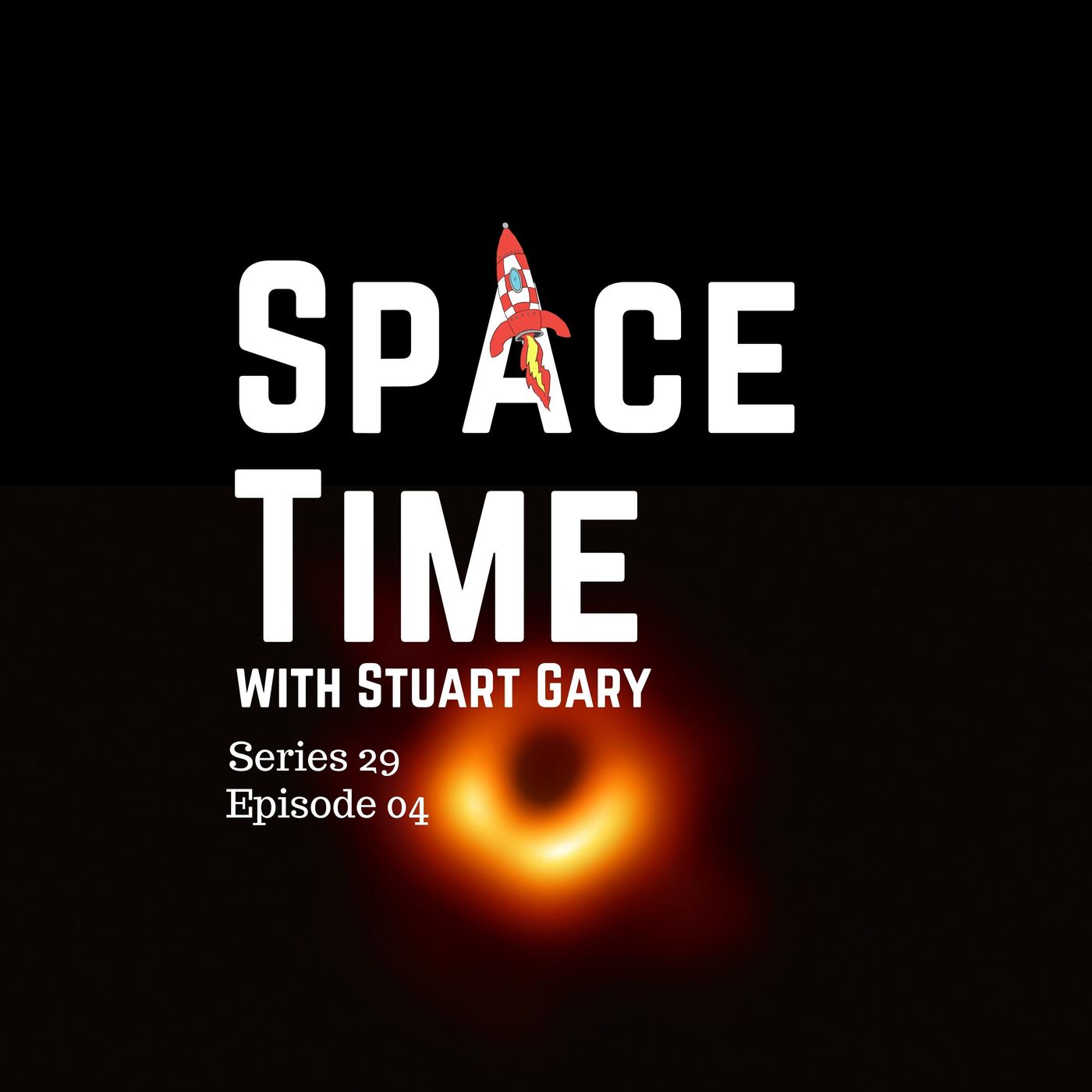
SpaceTime with Stuart Gary Gary - Series 29 Episode 4
In this episode of SpaceTime, we explore the latest revelations about supermassive black holes, the enigmatic interstellar comet 3I Atlas, and NASA's innovative tests on lunar surface interactions.
Do All Galaxies Host Supermassive Black Holes?
A groundbreaking study utilizing NASA's Chandra X-ray Observatory challenges the long-held belief that all galaxies harbor supermassive black holes at their centers. Analyzing data from over 1,600 galaxies, researchers discovered that only about 30% of dwarf galaxies contain these cosmic giants. The findings, published in the Astrophysical Journal, provide crucial i...
Cosmic Clues: Unlocking Dark Matter Secrets from a Distant Supernova
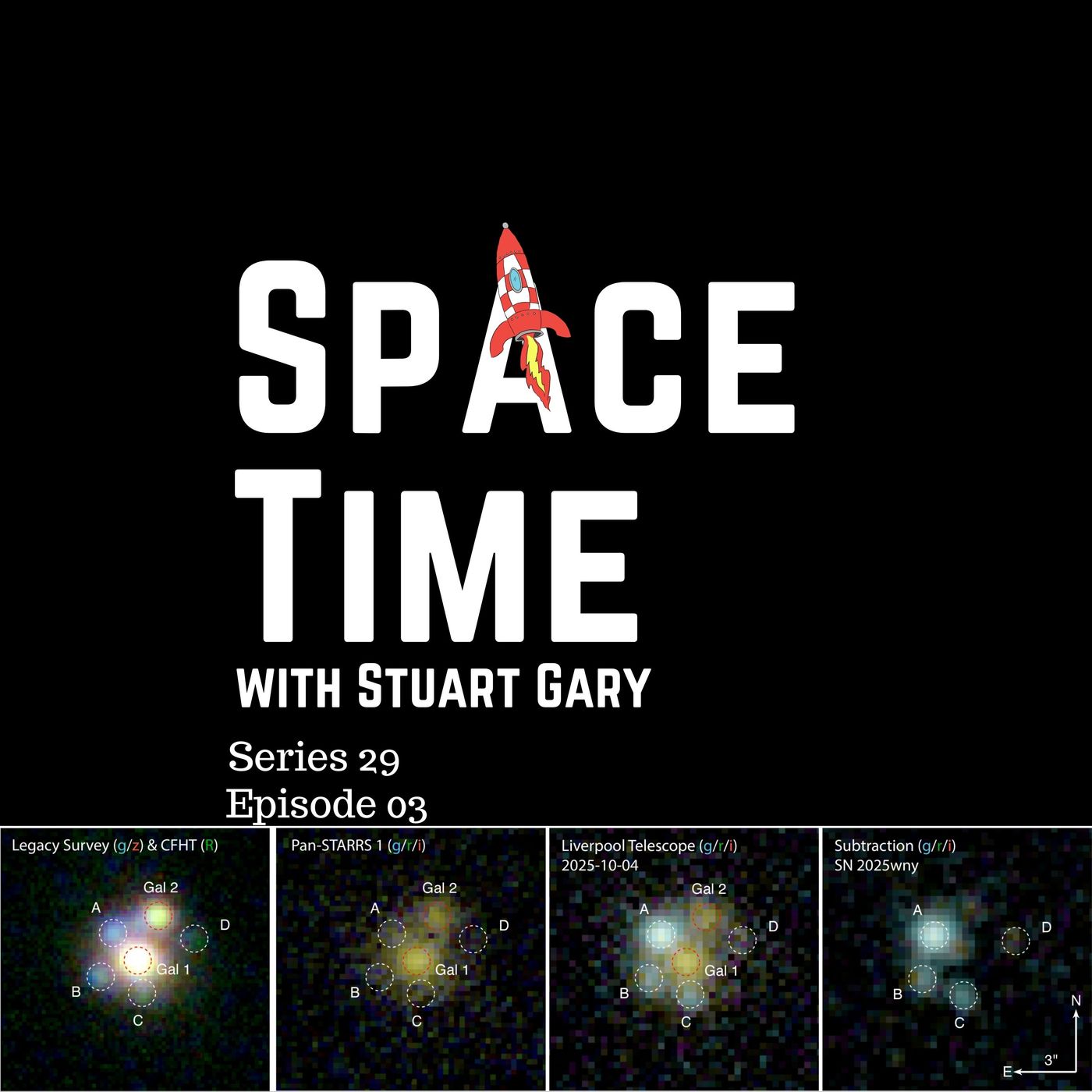
SpaceTime with Stuart Gary Gary - Series 29 Episode 3
In this episode of SpaceTime, we delve into the latest discoveries in astrophysics and the challenges faced by space agencies worldwide.
Ancient Supernova Offers Clues to Dark Energy
Astronomers have made significant strides in understanding dark energy, the enigmatic force driving the universe's accelerated expansion. A newly observed supernova, located 10 billion light years away, has been gravitationally lensed by a foreground galaxy, allowing scientists to analyze multiple images of the same explosion. This phenomenon could help determine the Hubble constant, shedding light on t...
Galactic Secrets: Unravelling the Milky Way's Chemical Bimodality
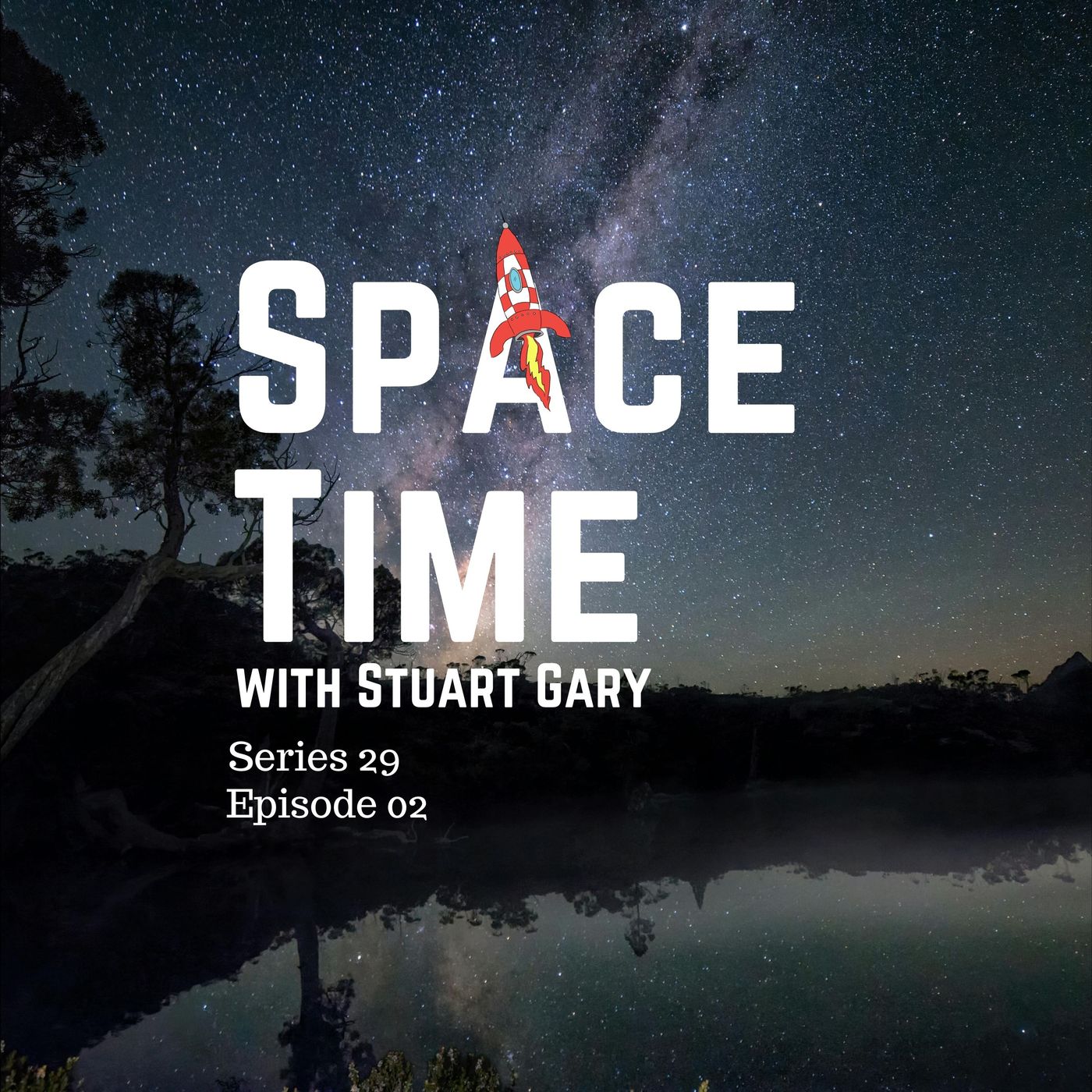
SpaceTime with Stuart Gary Gary - Series 29 Episode 2
In this episode of SpaceTime, we explore the intriguing history of our galaxy and the secrets of Earth's early water retention.
Unraveling the Milky Way's Chemical Bimodality
A groundbreaking study suggests that the Milky Way's stellar formation and its unique chemical bimodality may stem from intergalactic gas rather than traditional star formation or galactic collisions. Researchers utilized advanced computer simulations to analyze the formation of 30 simulated galaxies, revealing that the Milky Way's distinct groups of stars, defined by their iron and magnesium content, c...
Stellar Spectacles: January's Night Sky Highlights
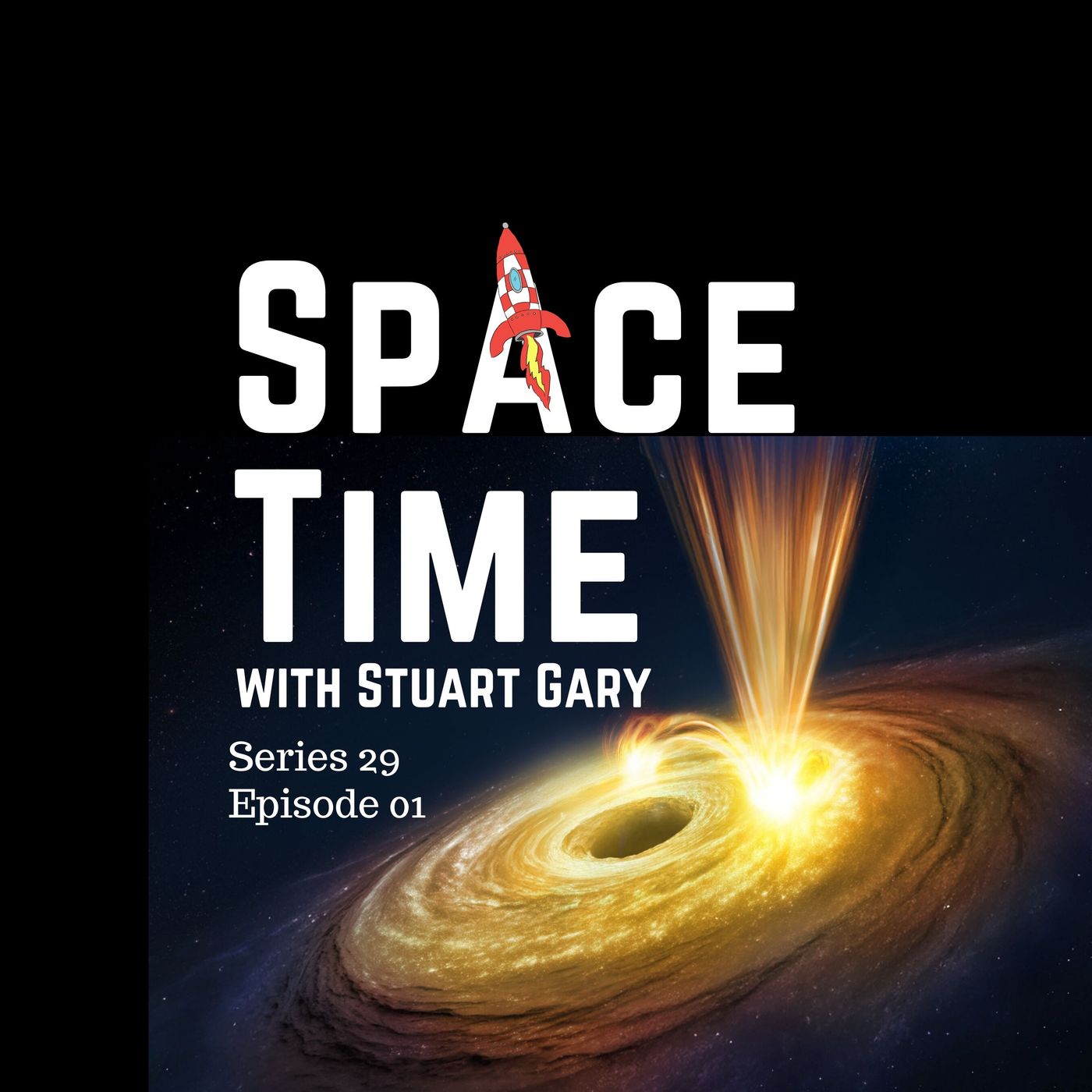
SpaceTime with Stuart Gary Gary - Series 29 Episode 1
In this episode of SpaceTime, we delve into extraordinary cosmic phenomena and the ongoing exploration of our solar system.
Cosmic Matter Ejected at 20% the Speed of Light
Astronomers have made a groundbreaking observation of matter being ejected from a supermassive black hole at the center of the barred spiral galaxy NGC 3783, located 135 million light years away. This matter, propelled at an astonishing 20% the speed of light, challenges previously held notions about how such superluminal jets are powered. The findings suggest that a sudden c...
Lunar Leap: Artemis 2's Historic Mission and the Future of Moon Exploration
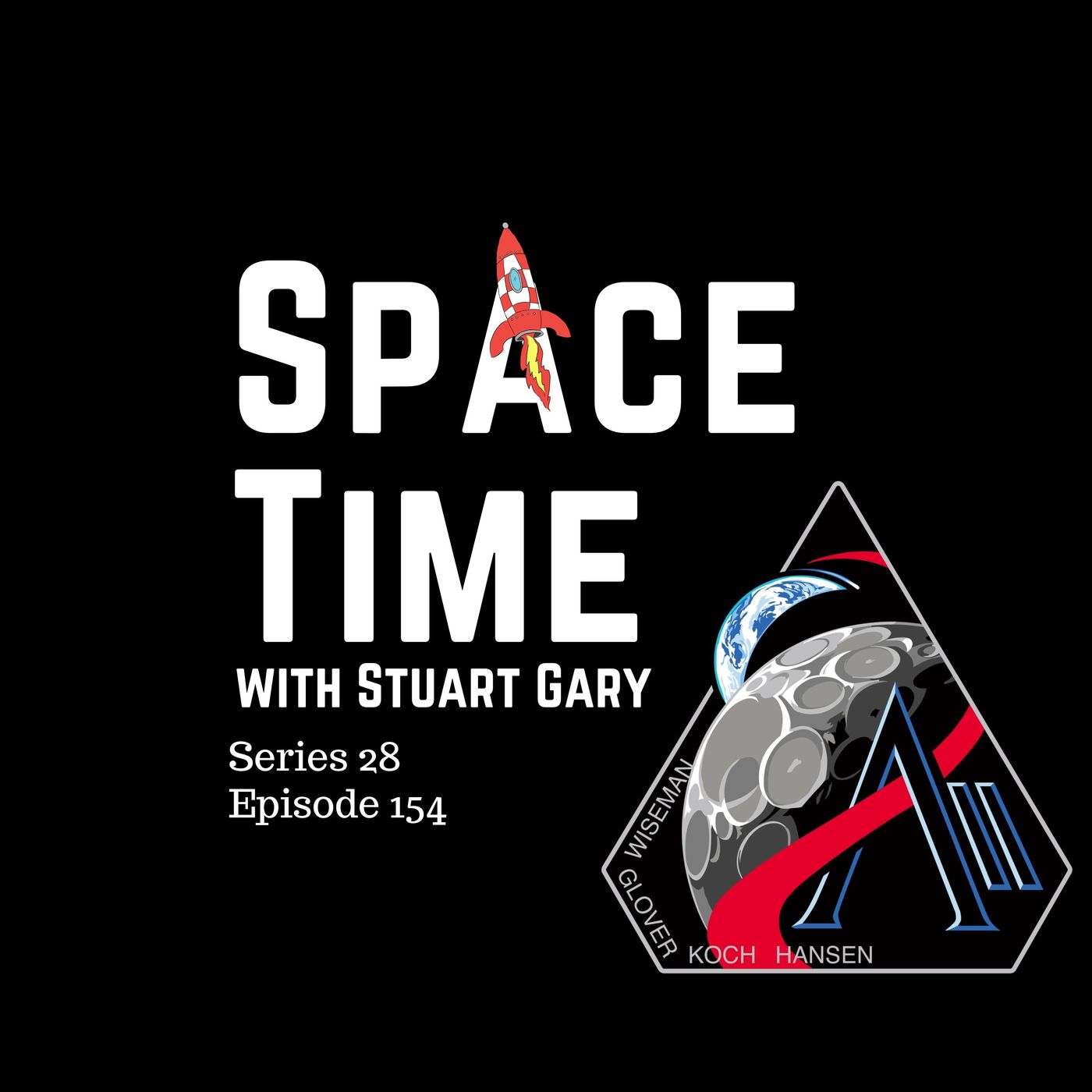
SpaceTime with Stuart Gary - Series 28 Episode 154
In this episode of SpaceTime, we explore significant milestones in lunar exploration and the latest challenges in space technology.
Accelerated Launch for Artemis 2
NASA has moved up the launch date for the historic Artemis 2 manned moon mission to early February, marking the first human journey to the moon in over 50 years since Apollo 17. The Orion spacecraft, named Integrity, will embark on a 10-day mission, completing a free return trajectory around the moon. This episode discusses the mission's objectives, including in-space demonstrations and the deployment o...
Doomsday Dance: Ramses Mission and the Secrets of Apophis
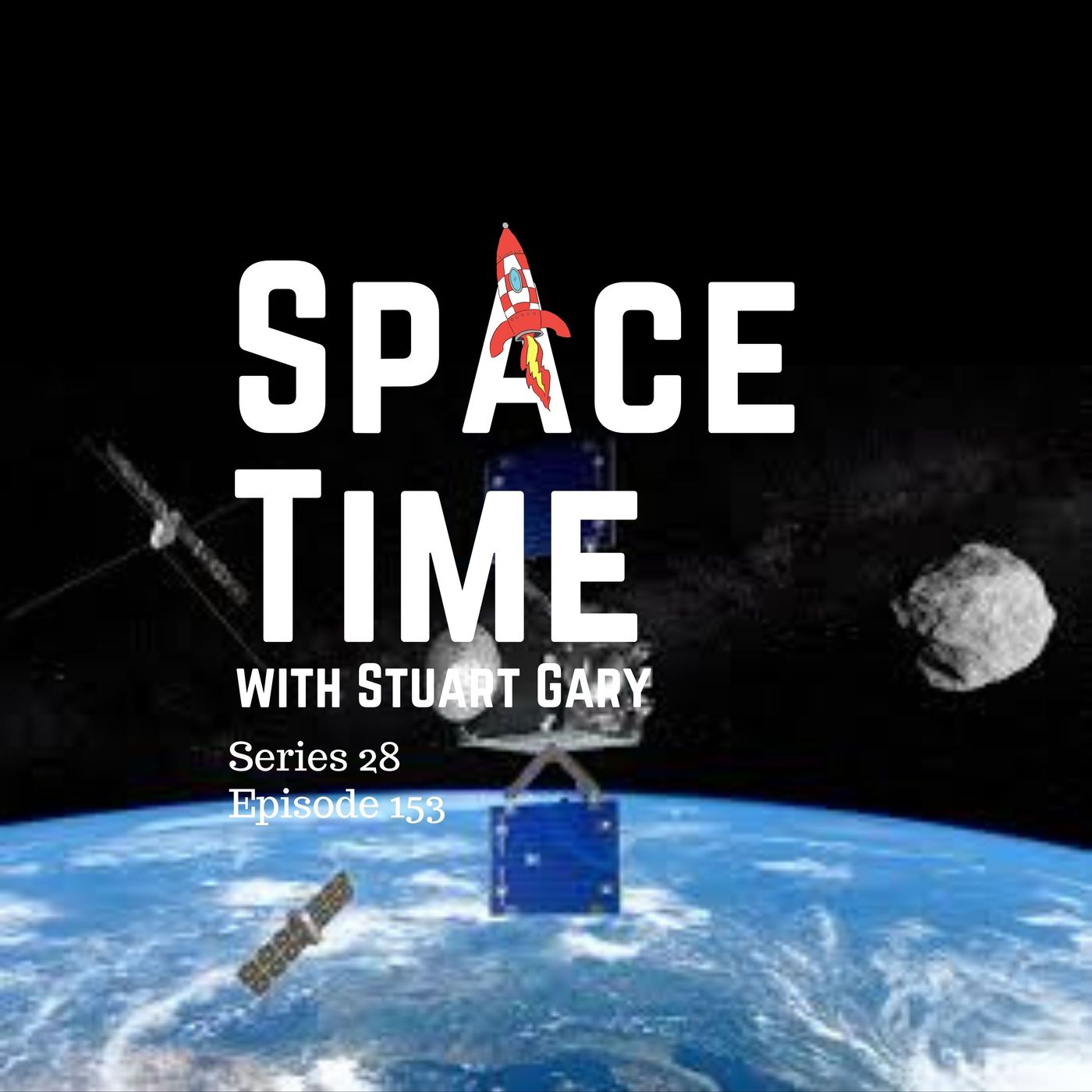
SpaceTime with Stuart Gary Gary - Series 28 Episode 153
In this episode of SpaceTime, we dive into thrilling new missions and groundbreaking discoveries in the universe.
Ramses Mission to Asteroid Apophis
The European Space Agency has greenlit an exciting new mission to study the infamous doomsday asteroid Apophis. The Ramses spacecraft will closely observe the 450-meter-wide asteroid as it makes a close flyby of Earth on April 13, 2029, at a mere 32,000 kilometers away—closer than many satellites. Initially feared to be on a collision course with Earth, further observations have since ruled out the...
Super Kilonova Surprise: Unravelling the Mystery of Cosmic Explosions

In this episode of SpaceTime, we uncover groundbreaking astronomical events and the latest advancements in space exploration.
First Ever Super Kilonova Detected
Astronomers have made a significant discovery with the potential detection of the first ever super kilonova explosion. This extraordinary event, cataloged as AT 2025ULZ, is believed to have been triggered by a double supernova explosion, producing both gravitational waves and electromagnetic radiation. Lead author Manzi Kasliwal from Caltech's Palomar Observatory discusses how this unique phenomenon could reshape our understanding of stellar evolution and the formation of heavy elements in the universe. With o...
Martian Moves: Perseverance's Journey and Fashionable Microbes in Space
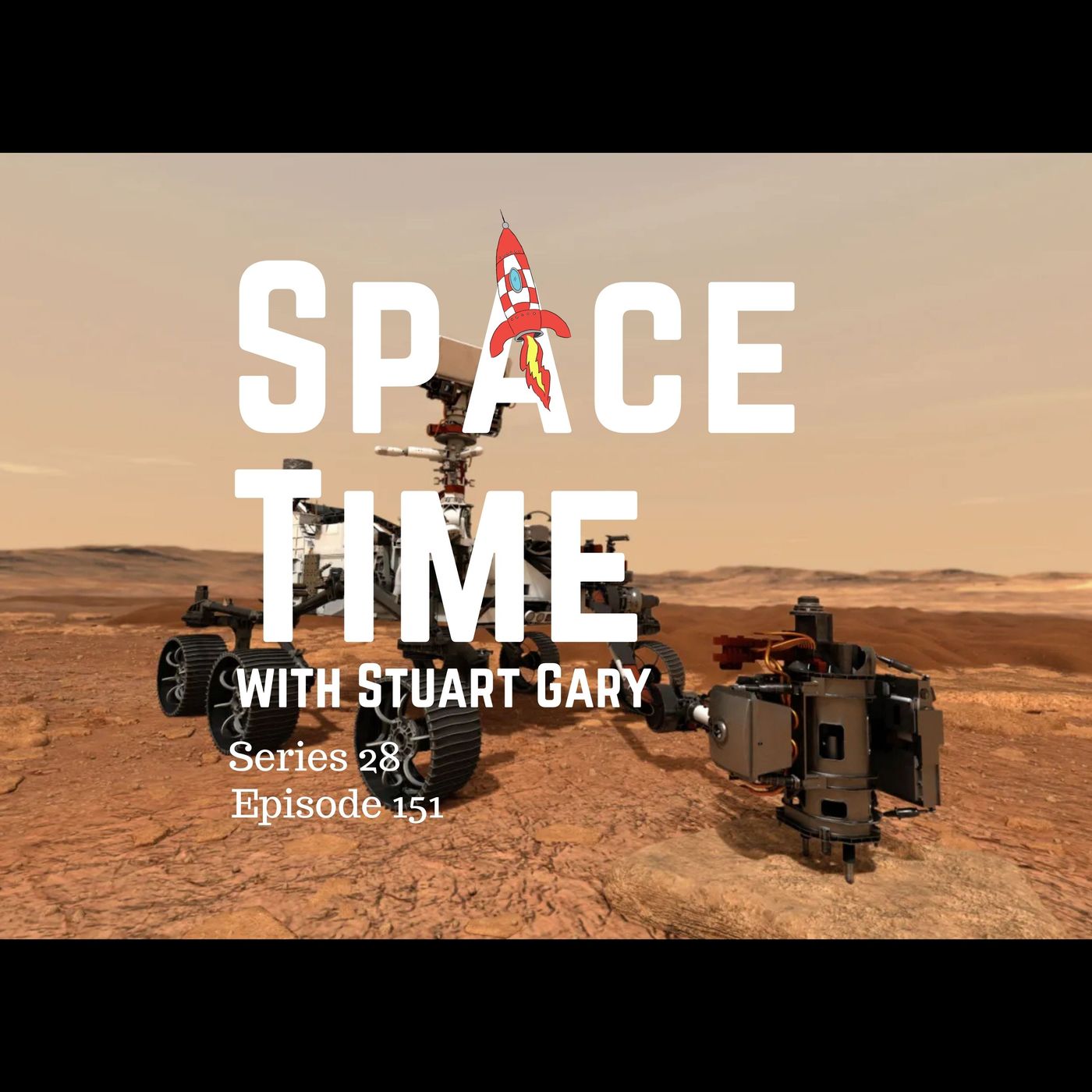
In this episode of SpaceTime, we explore significant advancements in space exploration and innovative scientific projects.
Perseverance Rover's New Journey
After nearly five years on Mars, NASA's Perseverance Rover is on the move again, heading to a new site on the rim of Jezero Crater named Lac du Charm. Having traversed over 40 kilometres and collected vital rock core samples, the rover is undergoing extensive evaluations to ensure its longevity, with engineers confident it can operate until at least 2031. We discuss the rover's advanced autonomous driving capabilities and its mission to uncover signs of past m...
Stellar Ballet: Apep's Cosmic Dance and Titan's Liquid Mystery
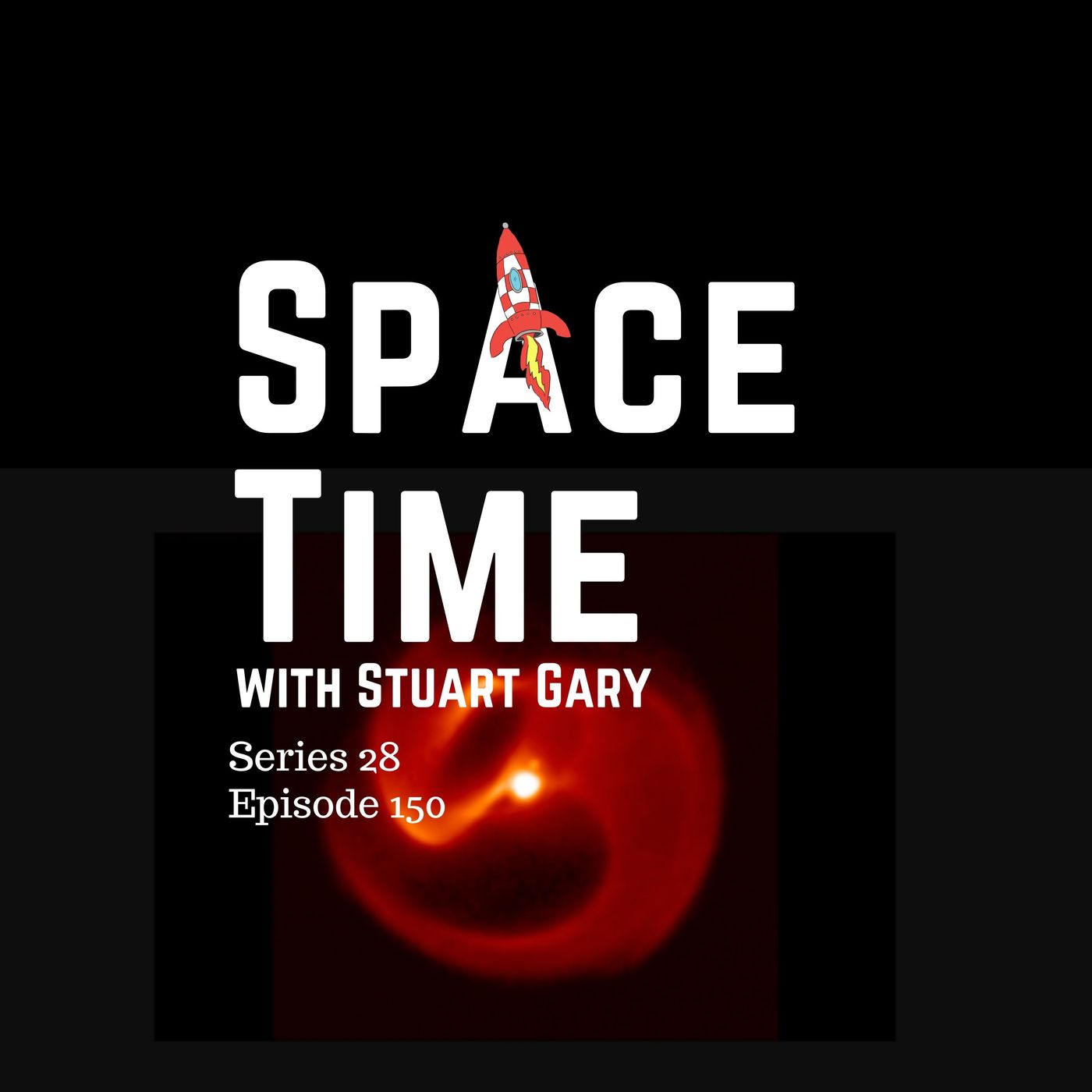
SpaceTime with Stuart Gary Gary - Series 28 Episode 150
In this episode of SpaceTime, we delve into intriguing discoveries and ongoing challenges in the realm of astrophysics and planetary science.
Cosmic Dance of Dying Stars
Astronomers have made fascinating observations of a unique star system named Apep, located over 8,000 light years away in the constellation Norma. This rare system consists of three massive stars locked in a 190-year orbit, creating stunning spirals of cosmic dust. Using the advanced capabilities of NASA's Webb Space Telescope and the Very Large Telescope in Chile, researchers c...
Cosmic Milestones: The Earliest Supernova and Martian Water Mysteries
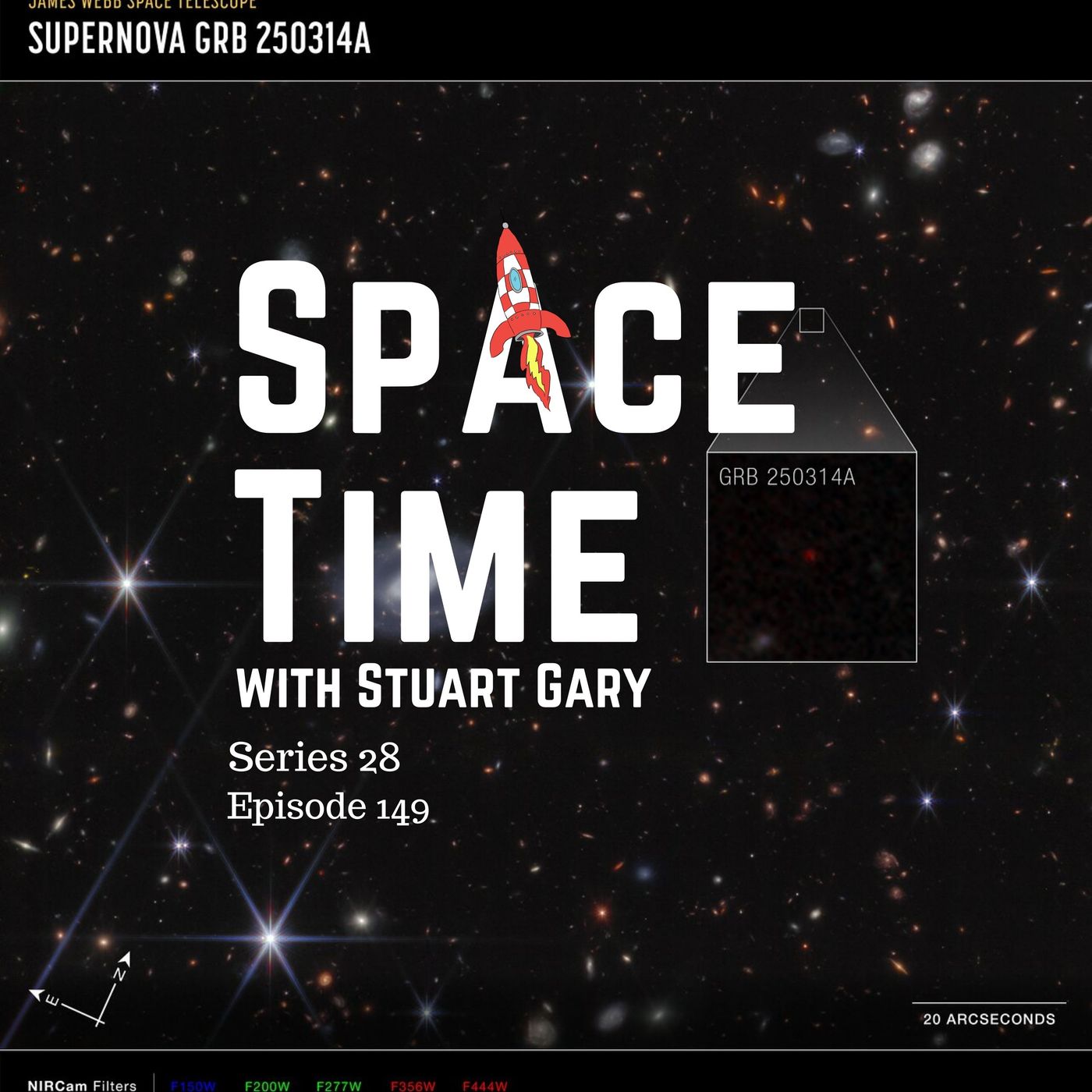
In this episode of SpaceTime, we uncover groundbreaking discoveries and exciting celestial events that illuminate our understanding of the universe.
Earliest Supernova Ever Detected
Astronomers have achieved a remarkable milestone by detecting the earliest supernova ever observed, dating back to a mere 730 million years after the Big Bang. Using the powerful Webb Space Telescope, this supernova, cataloged as GRB250314A, emitted a gamma ray burst that has shattered previous distance records. Lead author Andrew Levin shares insights into how this discovery provides a glimpse into the universe when it was only 5% of its current a...
Gamma Ray Revolution: The Longest Burst and Cosmic Mysteries Unveiled
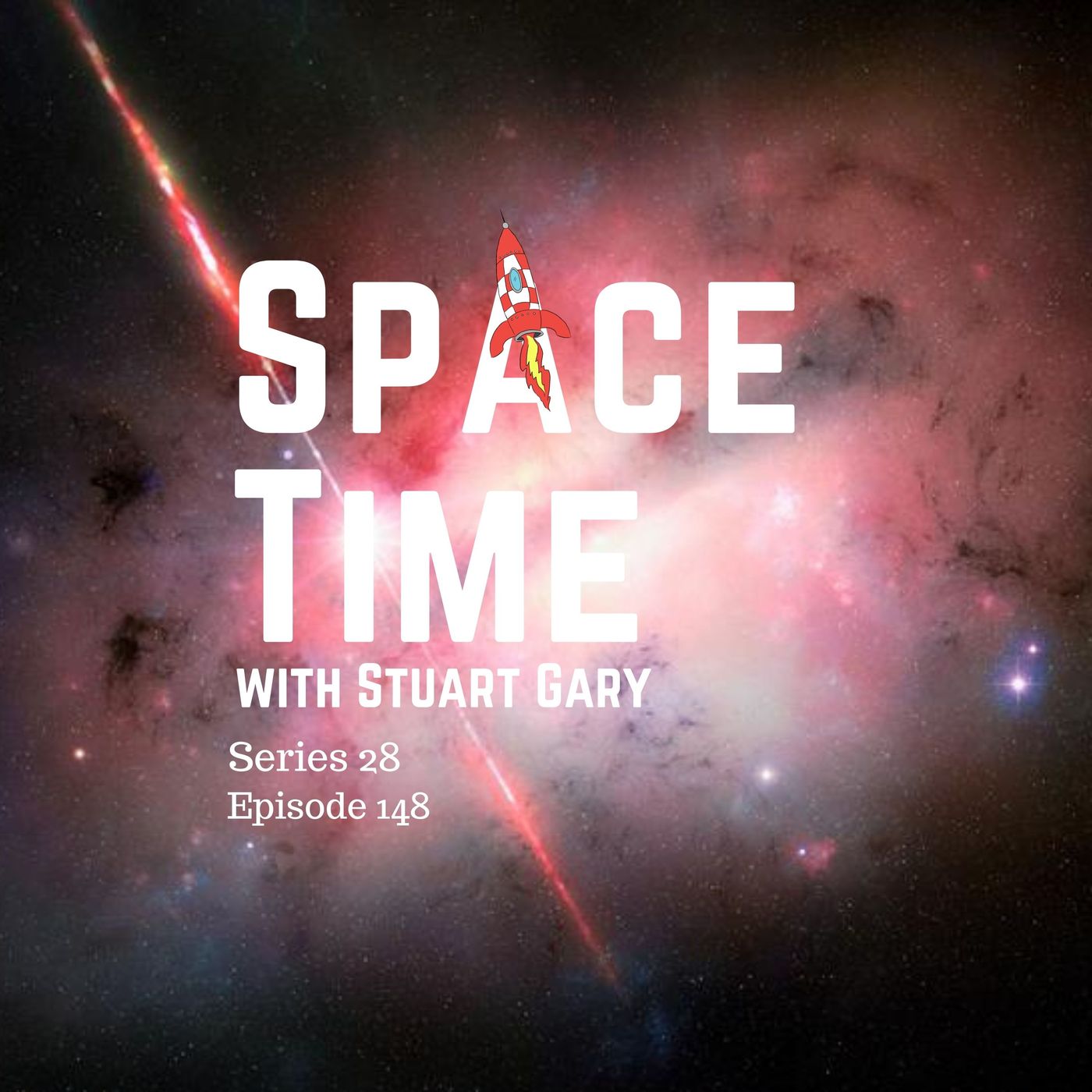
SpaceTime with Stuart Gary Gary - Series 28 Episode 147
In this episode of SpaceTime, we delve into remarkable discoveries that significantly enhance our understanding of the cosmos.
Longest Gamma Ray Burst Ever Detected
Astronomers have made headlines with the discovery of the longest gamma ray burst ever recorded, GRB 250702B, which lasted over seven hours. This unprecedented event is reshaping our understanding of stellar explosions and their aftermath. Initial observations indicate that this extraordinary burst may have originated from a black hole consuming a star, prompting new theories about the mechanisms behind t...
MAVEN's Silence: Unravelling the Mystery of Mars' Lost Contact
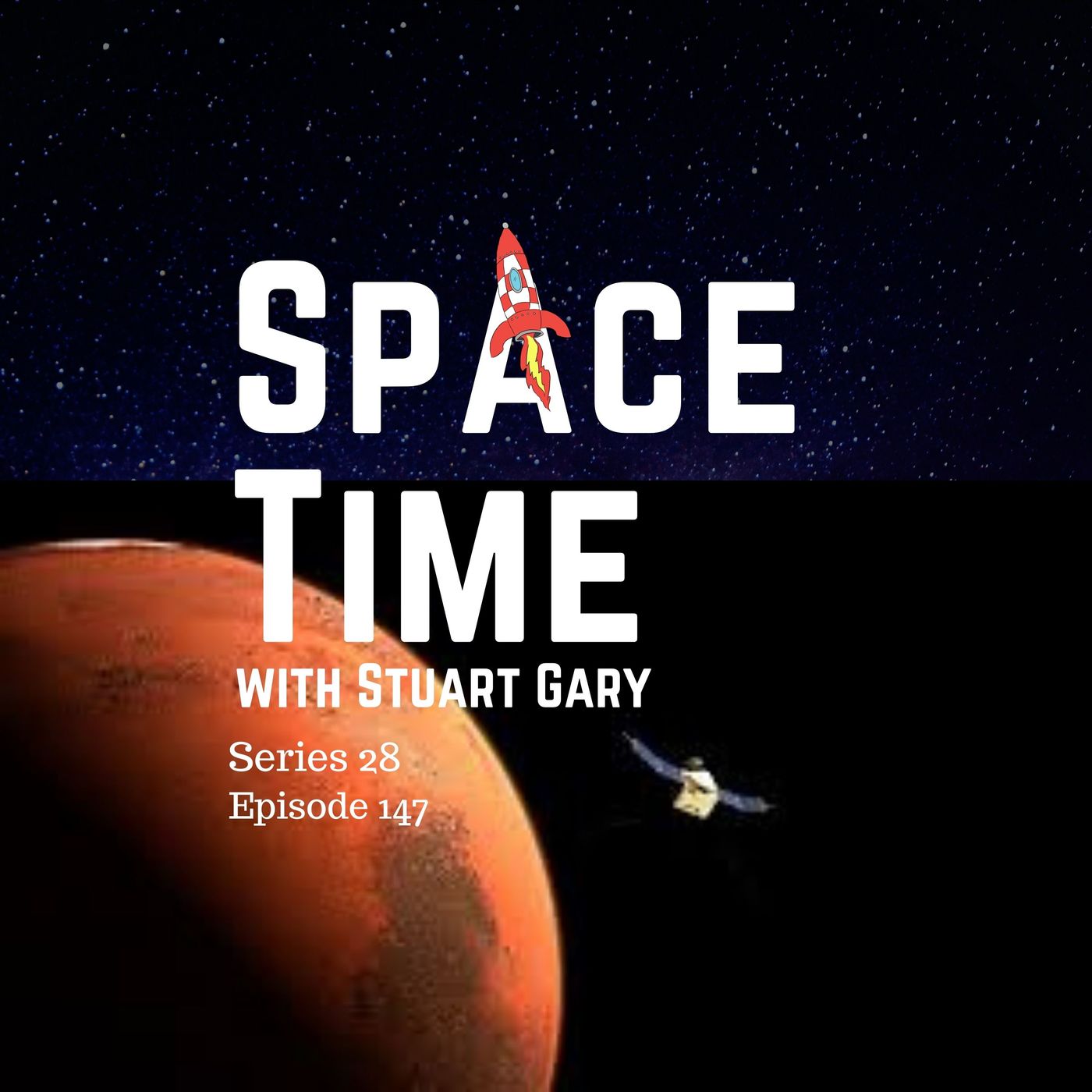
In this episode of SpaceTime, we explore significant developments in space exploration and cosmic studies that could reshape our understanding of the universe.
Nasa's MAVEN Mars Orbiter: Communication Loss
NASA's MAVEN (Mars Atmosphere and Volatile Evolution) spacecraft has gone silent, with contact lost on December 6th after passing behind Mars. The orbiter has been a vital asset for over a decade, studying the Martian atmosphere and solar wind interactions that have transformed Mars from a water-rich world to a cold desert. We delve into MAVEN's critical findings, including the mechanisms of atmospheric escape and t...
Uranus Unveiled: Decoding the Mystery of Radiation Belts and Martian River Systems

In this episode of SpaceTime, we tackle some of the most intriguing cosmic mysteries and discoveries that could reshape our understanding of the universe.
Unraveling Uranus: The Mystery of Its Radiation Belts
For 39 years, the intense electron radiation belts surrounding Uranus have puzzled scientists since NASA's Voyager 2 flyby in 1986 revealed unexpectedly high levels of radiation. New analyses suggest these findings may be explained by a solar wind structure interacting with the Uranian system during Voyager 2's visit. This research opens up new questions about the fundamental physics governing these extreme energy levels and the...
Bennu's Bounty: Uncovering Sugars, Space Gum, and Stardust in Asteroid Samples
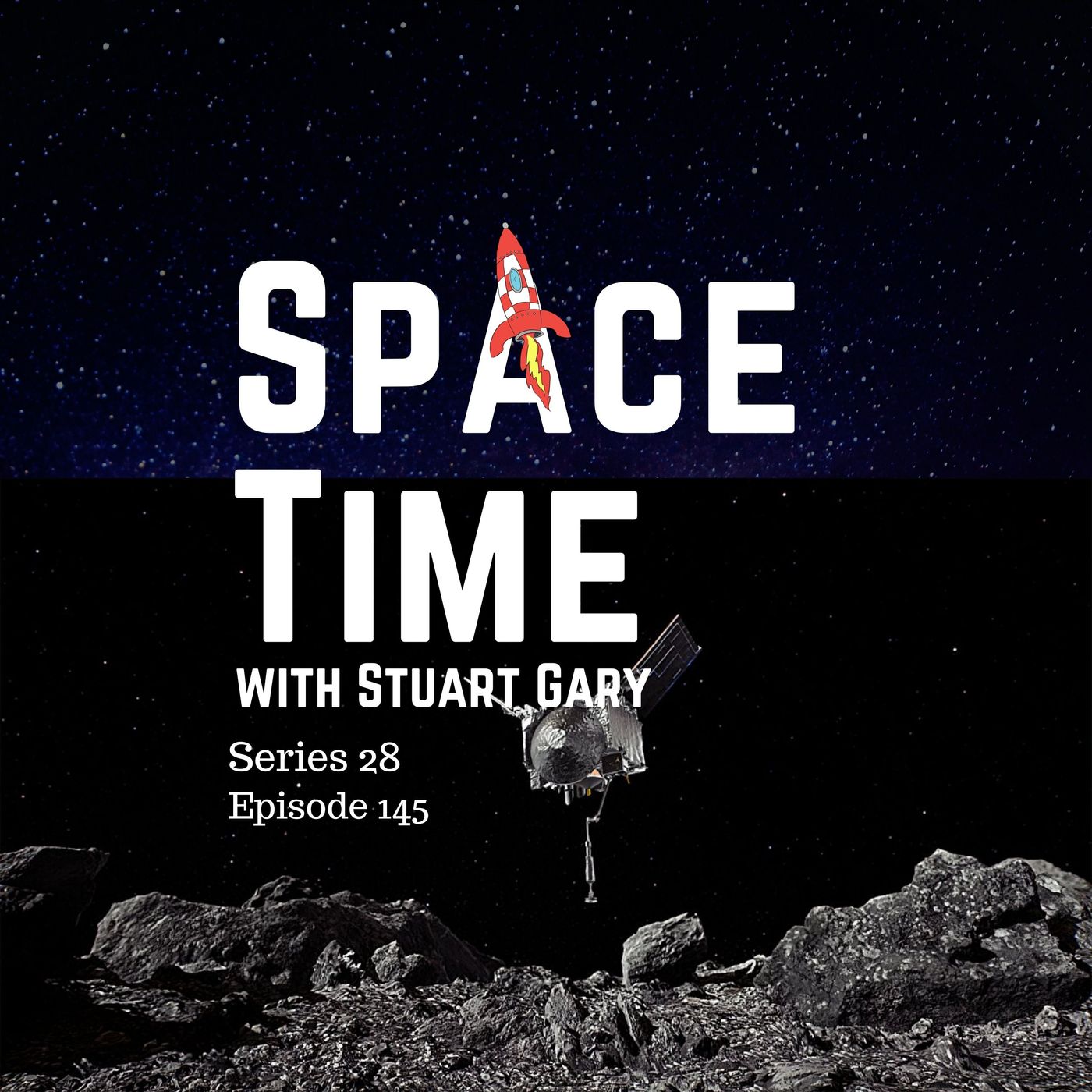
SpaceTime with Stuart Gary - Series 28 Episode 145
In this episode of SpaceTime, we explore groundbreaking discoveries that deepen our understanding of the origins of life and the dynamics of our galaxy.
Sugars and Stardust: Insights from Asteroid Bennu
NASA's Osiris Rex mission has returned samples from the asteroid Bennu, revealing the presence of biologically essential sugars, including ribose and glucose, along with a unique gum-like substance never before seen in astromaterials. These findings, published in Nature Geoscience and Nature Astronomy, suggest that the building blocks for life were widespread throughout the earl...
Galactic Tug-of-War: The Small Magellanic Cloud's Struggle Against Gravitational Forces
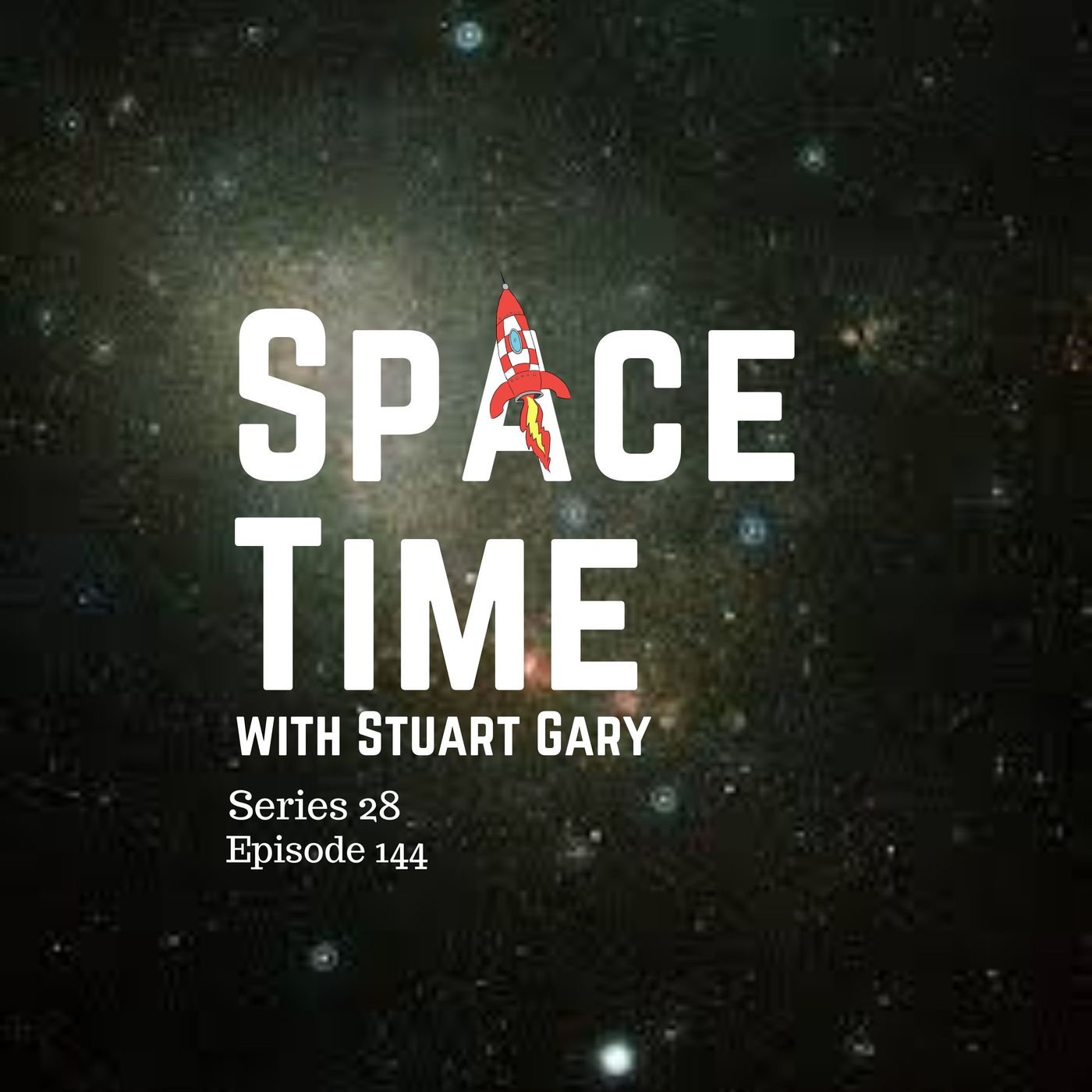
(00:00:00) Galactic Tug-of-War: The Small Magellanic Cloud's Struggle Against Gravitational Forces
(00:00:46) One of our nearest neighbouring galaxies being torn apart
(00:08:00) A giant spider on the Jovian Ice Moon Europa
(00:12:23) Mars could have been habitable for long periods
(00:14:14) The Science Report
(00:17:23) Skeptics guide to why some people are born suckers
(00:20:24) Episode Wrap
In this episode of SpaceTime, we delve into fascinating cosmic phenomena and groundbreaking discoveries that could reshape our understanding of the universe.
The Small Magellanic Cloud: A Galaxy Under Duress
Astronomers have uncovered that the Small M...
Lightning Strikes Mars: The First Detection of Electrical Discharges and NASA's New Look at Comet 3I Atlas
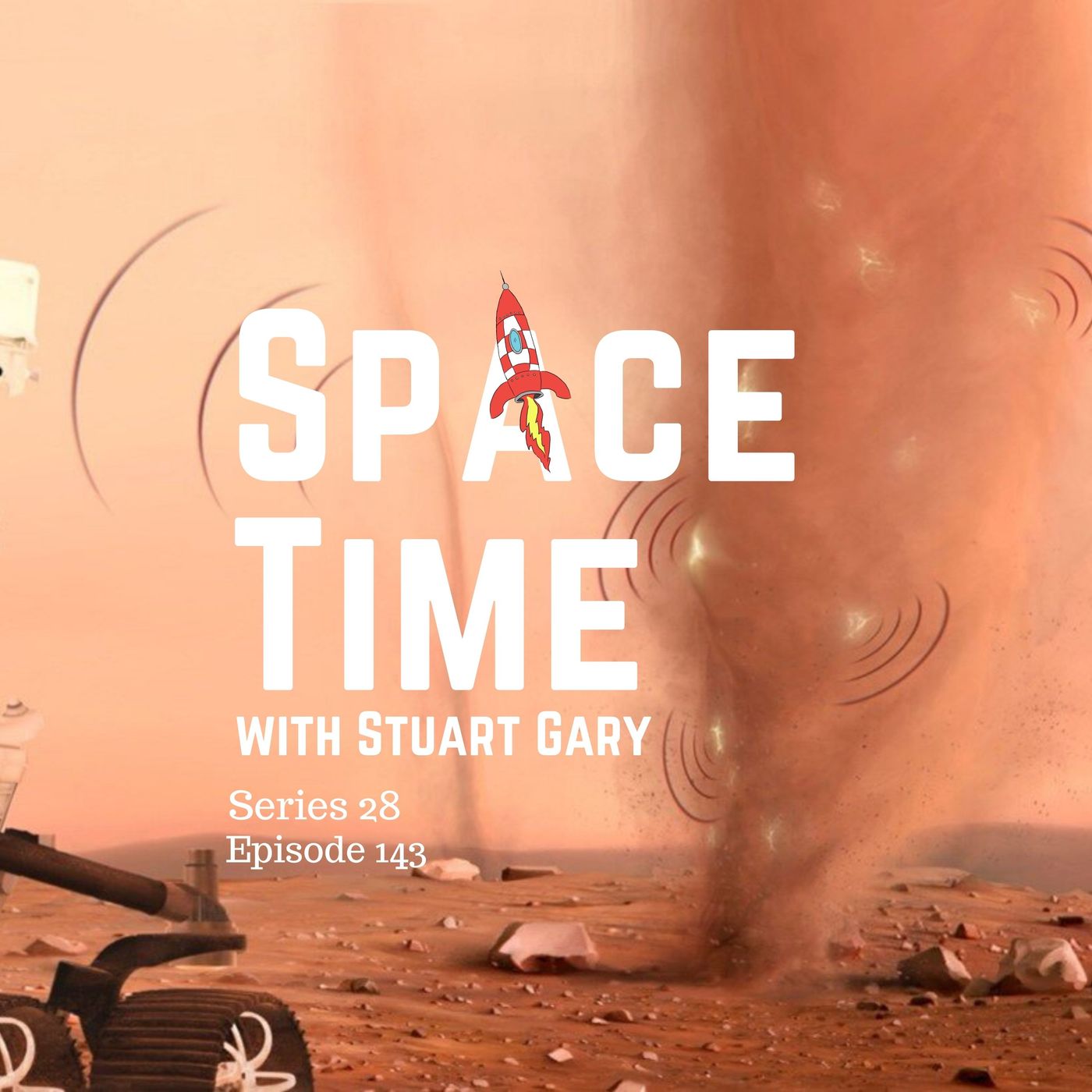
In this episode of SpaceTime, we explore groundbreaking discoveries and intriguing phenomena from Mars to the depths of space.
Lightning Strikes on Mars: A Historic Discovery
NASA's Perseverance Rover has made a remarkable find by detecting lightning in the Martian atmosphere for the first time. Recorded within two dust devils in Jezero Crater, the rover's Supercam microphone captured electromagnetic and acoustic signals indicative of electrical discharges. This discovery not only confirms long-held theories about Martian electrical activity but also reveals significant implications for the planet's atmospheric chemistry and potential hazards for future missions.
Theia Unveiled: Tracing the Origins of Earth's Moon and Lucy's Journey to Jupiter's Trojans
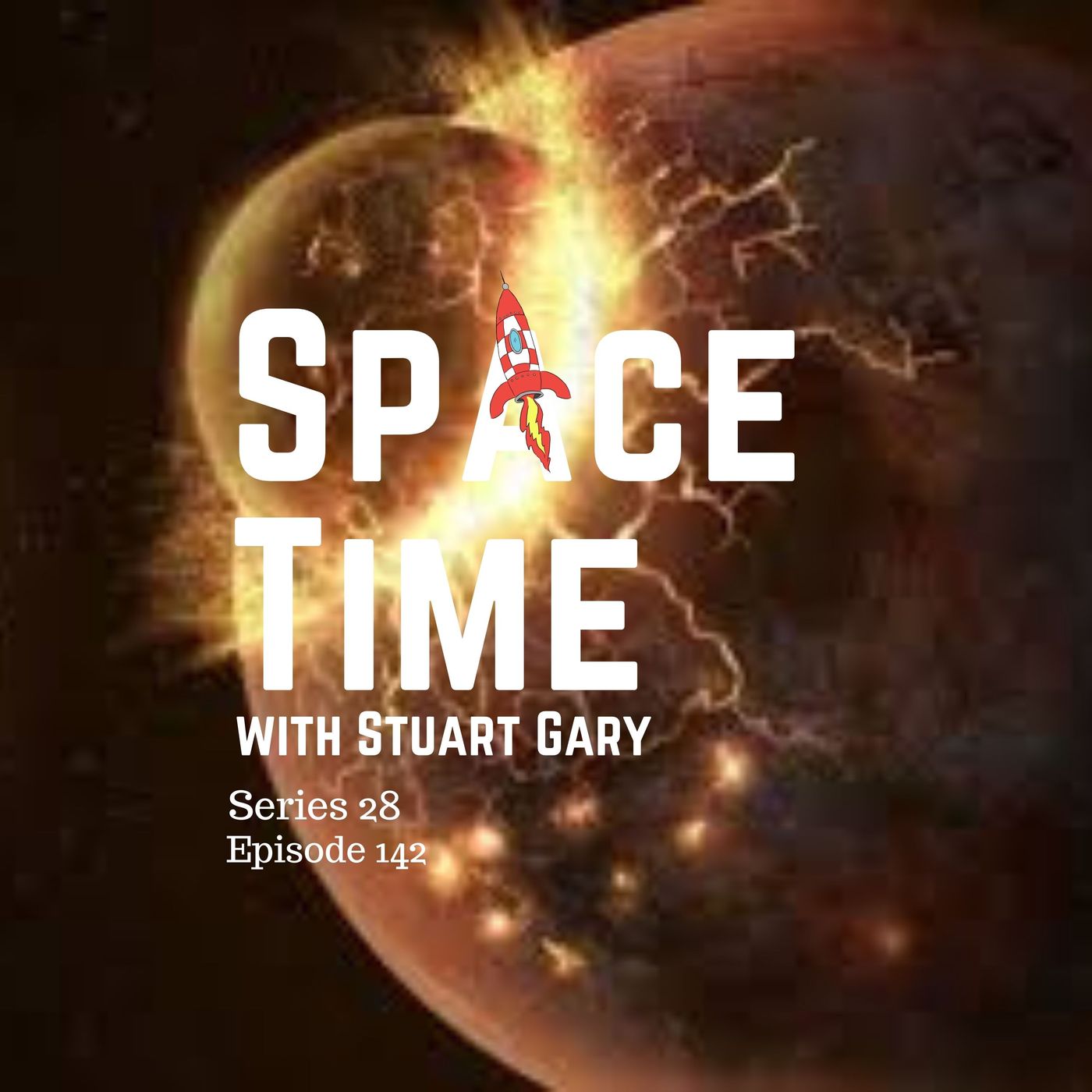
(00:00:00) Theia Unveiled: Tracing the Origins of Earth's Moon and Lucy's Journey to Jupiter's Trojans
(00:00:50) New study claims Theia and Earth were once neighbours
(00:06:16) Lucy’s mission to Jupiter’s trojan asteroids
(00:15:26) Starliner’s next mission to be limited to cargo only
(00:17:57) The Science Report
(00:23:17) Alex on Tech: Dooms Day clock countdown to Digital ID
In this episode of SpaceTime, we dive into the intriguing origins of our Moon and the latest developments in space exploration.
Theia: The Lost Planet Behind the Moon's Birth
A groundbreaking study reveals that Th...
Dark Matter Detected: A Breakthrough in Cosmic Mystery and CHEOPS' Next Milestone
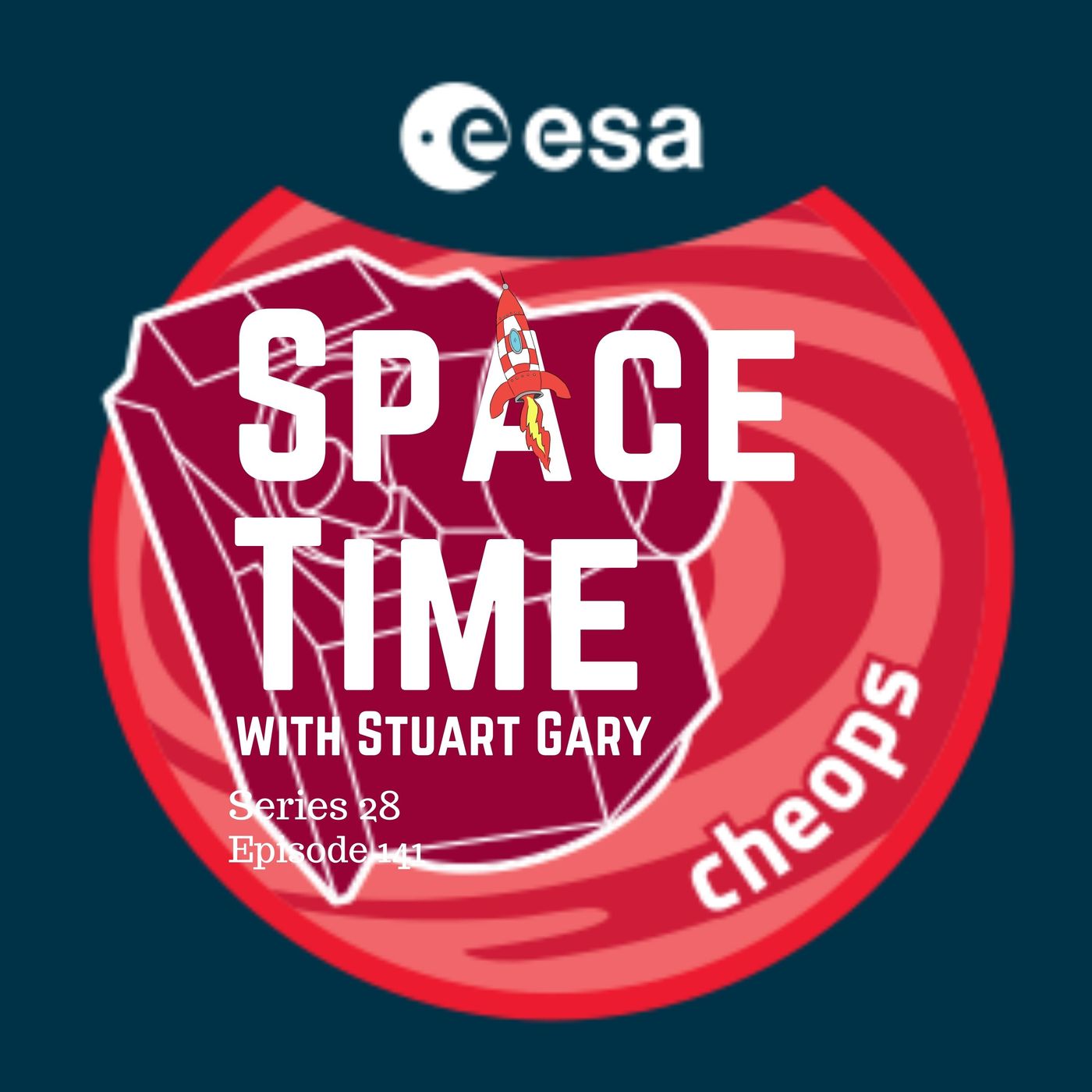
In this episode of SpaceTime, we explore groundbreaking advancements in our understanding of the universe and the challenges faced in space exploration.
Detecting Dark Matter: A Major Breakthrough
After nearly a century of speculation, scientists may have finally detected dark matter. A report in the Journal of Cosmology and Astroparticle Physics reveals that gamma rays emitted from dark matter particle collisions have been observed using NASA's Fermi Gamma Ray Space Telescope. This discovery aligns with predictions about dark matter's existence and could signify a new particle not included in the current standard model of p...
Interstellar Insights: Tracking Comet 3I/Atlas and the Ganon Superstorm's Impact on Earth
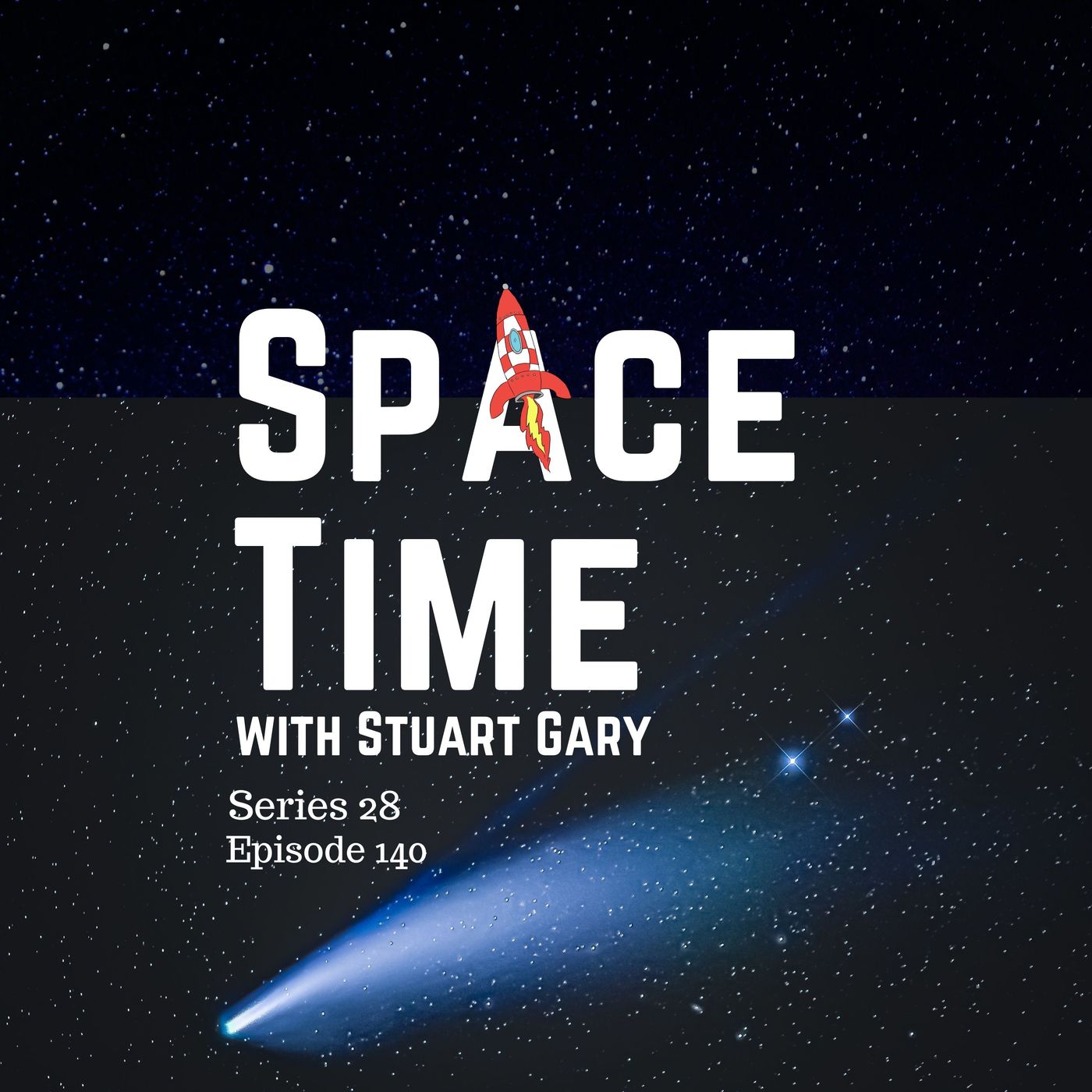
In this episode of SpaceTime, we delve into the latest discoveries and challenges in space exploration and Earth science.
Tracking Interstellar Comet 3I Atlas from Mars
The European Space Agency has successfully monitored interstellar comet 3I Atlas from its ExoMars Trace Gas Orbiter, significantly improving the accuracy of its predicted trajectory by a factor of ten. The comet, which travels at speeds of up to 250,000 km/h, was observed from a unique vantage point, allowing astronomers to refine its path through our solar system. This remarkable achievement underscores the importance of multi-location observations in p...
